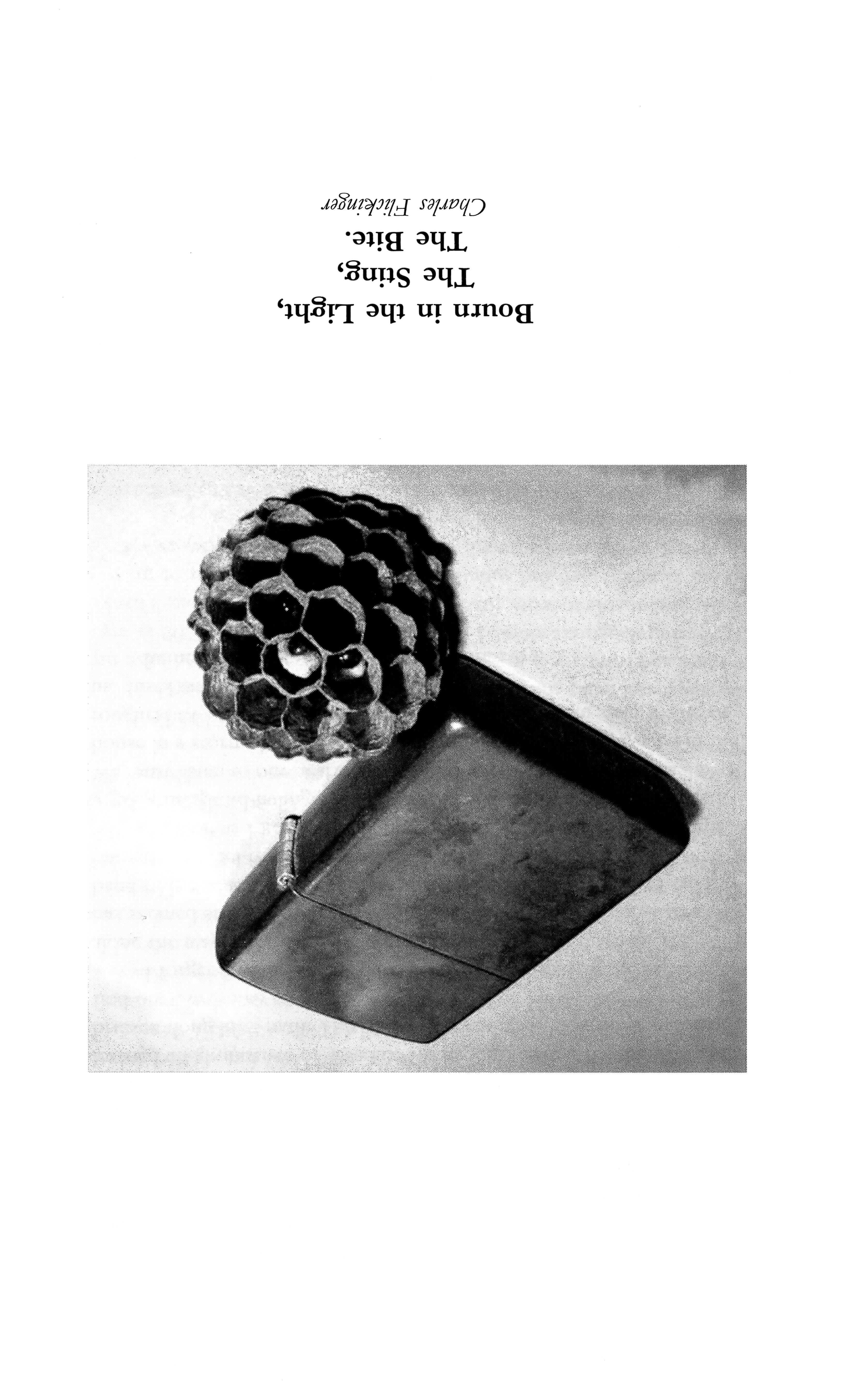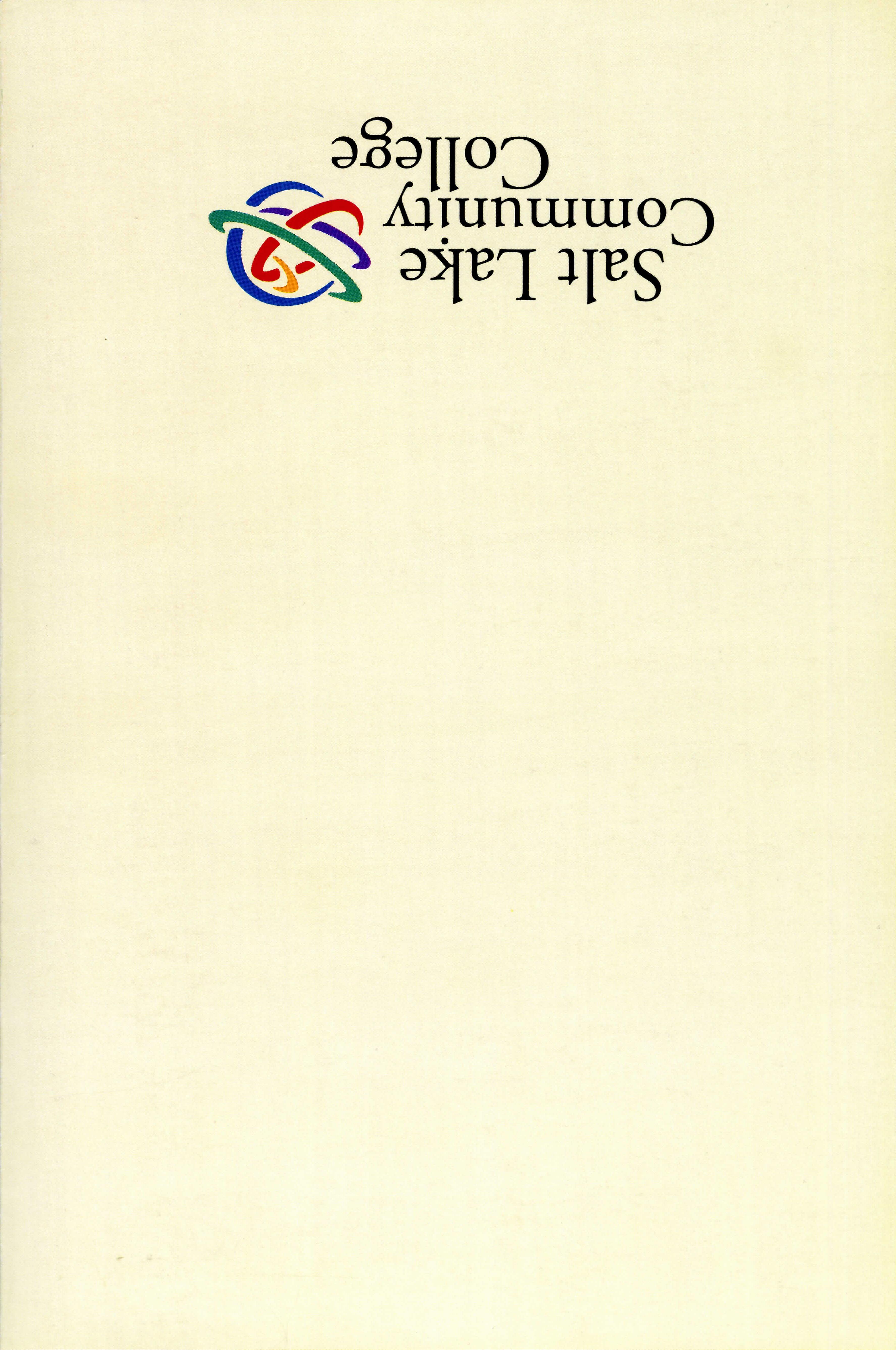




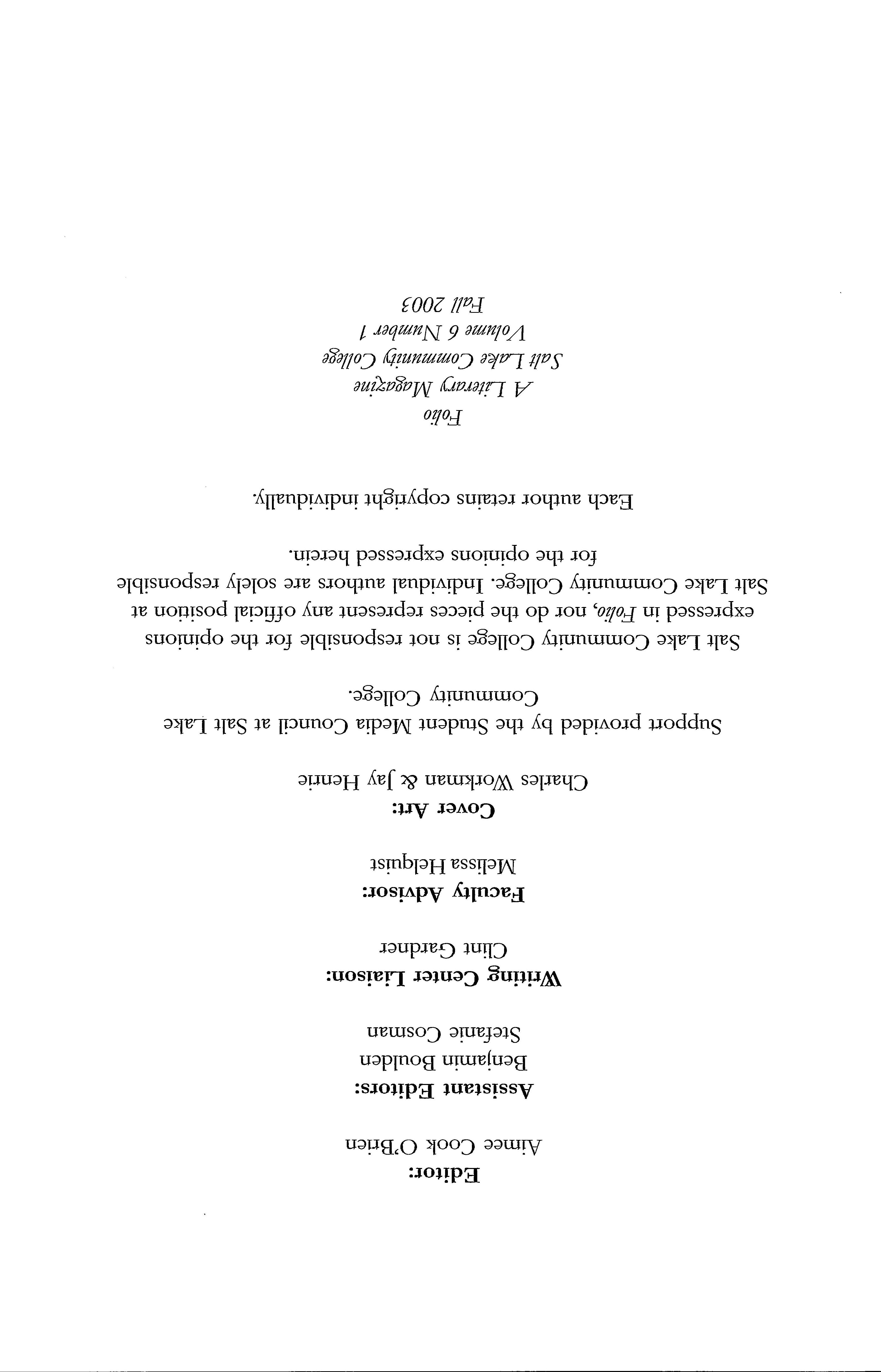
Editor:
Aimee Cook O'Brien
Assistant Editors: Benjamin Boulden Stefanie Cosman
Writing Center Liaison: Clint Gardner
Faculty Advisor: Melissa Helquist
Cover Art: Charles Workman & Jay Henrie
Support provided by the Student Media Council at Salt Lake Community College.
Salt Lake Community College is not responsible for the opinions expressed in Folio, nor do the pieces represent any official position at Salt Lake Community College. Individual authors are solely responsible for the opinions expressed herein.
Each author retains copyright individually.
Folio
A Literary Magazine
Salt Lake Community College
Volume 6 Number 1
Fall 2003
Submissions:
Folio publishes fiction, poetry, drama, essays and art. Submissions are accepted year-round, and may be sent via e-mail.
Send e-mail submissions, only in word format, to Clint Gardner, clint.gardner@slcc.edu, Director, SLCC Writing Center, AD 218 or use the Folio Submission box in AD 218.
Editorial Contacts:
Clint Gardner
Melissa Helquist

957-4893
957-4303
Fiction
Bovine & Human [13] Brandon D. Alva
Heatseekers [17] Aimee Cook O'Brien
Rallying in Xanadu [27] Crystal Lowder
Company Oil [30] Clijf Bullard
Consequences [34] Candice Lowder
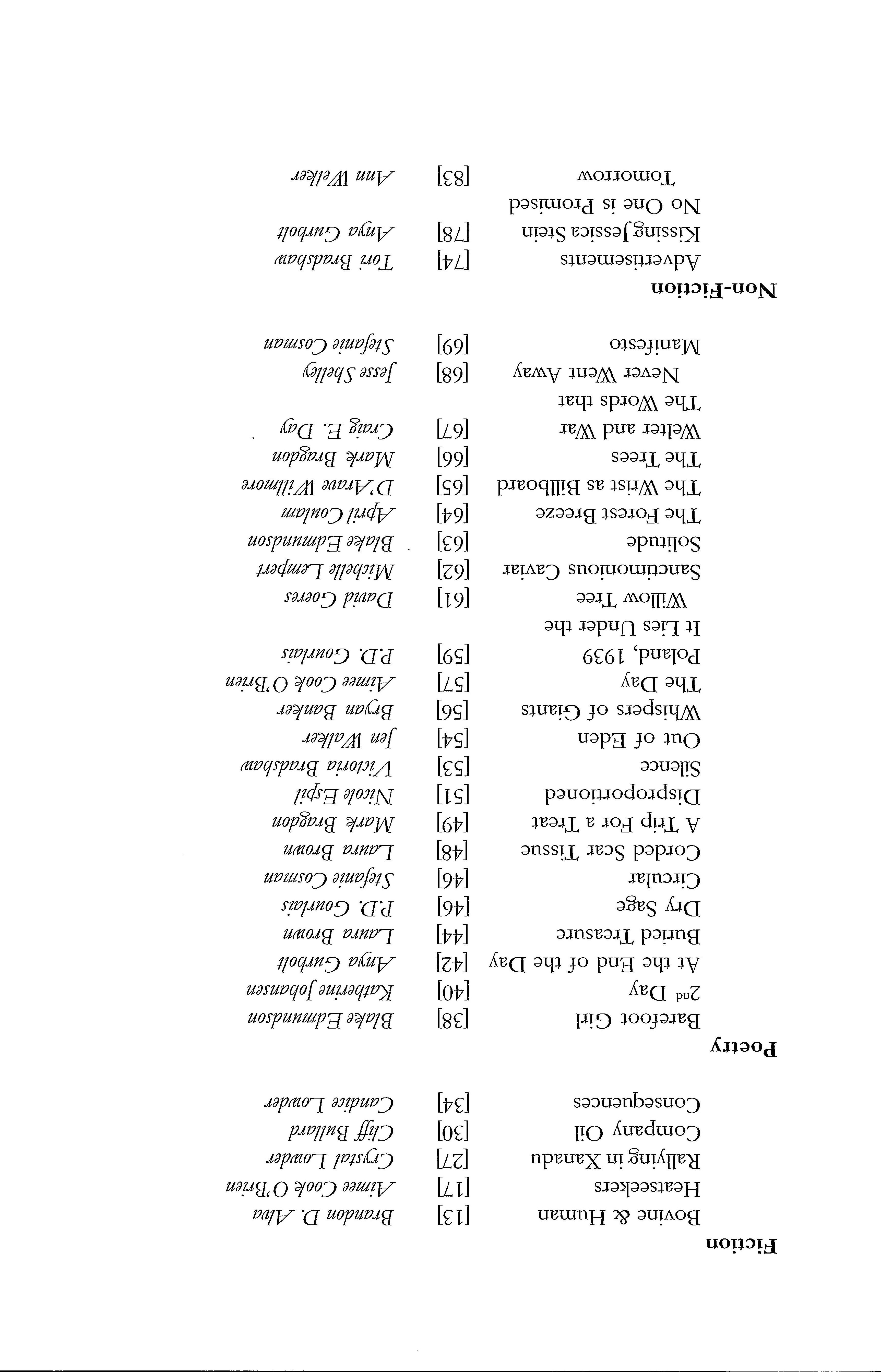
Poetry
Barefoot Girl [38] Blake Edmundson
2nd Day [40] Katherine Johansen
At the End of the Day [42] Af!Ya Gurholt
Buried Treasure [44] Laura Brown
Dry Sage [46] P.D. Gourlais
Circular [46] Stefanie Cosman
Corded Scar Tissue [48] Laura Brown
A Trip For a Treat [49] Mark Bragdon
Disproportioned [51] Nicole Espil
Silence [53] Victoria Bradshaw
Out of Eden [54] Jen Walker
Whispers of Giants [56] Bryan Banker
The Day [57] Aimee Cook O'Brien
Poland, 1939 [59] P.D. Gourlais
It Lies Under the
Willow Tree [61] David Goeres
Sanctimonious Caviar [62] Michelle Lempert
Solitude [63] Blake Edmundson
The Forest Breeze [64] April Coulam
The Wrist as Billboard [65] D'Arave Willmore
The Trees [66] Mark Bragdon
Welter and War [67] Craig E. Dqy
The Words that Never Went Away [68] Jesse S hellry
Manifesto [69] Stefanie Cosman
Non-Fiction
Advertisements [74] Tori Bradshaw
KissingJessica Stein [78] Af!Ya Gurholt
No One is Promised
Tomorrow [83] Ann Welker
Untitled Untitled
Untitled
Tanner's Flats Creek
Bourn in Light

Charles Workman
Sarah Guinn
Sarah Guinn
Tessie Kuennemann
Charles Flickinger

In this issue of Folio, we have made an attempt to walk the precarious line of producing a quality literary magazine with an eye toward giving a democratic voice to the student body of Salt Lake Community College. Our vision is to use Folio as a forum that is inclusive of not only what is deemed to be literary but anything, that is of a literary or artistic nature, which represents our college community.
This is the second issue with Aimee and Stefanie at the helm, each in a somewhat different capacity. We have also benefited from the energy and creative direction of our new Assistant Editor, Benjamin Boulden. We each have our own vision of what Folio should be, and without the input and at times competition of our individual ideas, this magazine would be much less than it is.
The only thing we ask of our readers is to go in with an open mind, and from there you will doubtless enjoy the journey that the writers and artists have prepared for you. Perhaps, at some point you will consider all editions of Folio as a treasured friend, a literary companion containing classics that you read over and over.
Aimee Cook O'Brien
Benjamin Boulden
Stefanie Cosman


A plain white board fence runs parallel to a dusty horizon, and long I""l.clistant white clouds cut the cold placid blue sky, parallel to the carbon colored power lines and the window frame that I gaze out of. Cows graze on the other side of the fence, on dead yellow grass. I stare for one moment, and then another, the clouds seem motionless but if I look away and then come back their shift from left to right is plainly visible.
I sit about ten minutes from Interstate fifteen. Its flow of traffic from the Canadian to Mexican borders connects three very different U.S. cities: Los Angeles, Las Vegas, and Salt Lake City. From Hollywood to the sandbox playground of vice to the home of the Mormons. But I am north of all of these places, not in a metropolis of population but still one of distinct character. I am in Idaho, Blackfoot Idaho. It is a lazy Sunday afternoon and my cousins and I lie about various couches in my aunt Robin's house.
It is quiet now, other than the hum of the football game on the television and my aunt Robin chopping in the kitchen, but soon, within an hour, the clatter of the extended family and a large meal will fill the house. Potatoes and salads will be piled on paper plates. Red KoolAid mixed with sprite will fill all the Dixie cups. I'll probably have water while I stuff myself with potatoes, roast and a little Jell-O salad. The homemade cookies, the canned beets, and the baked yams I'll try to avoid.
Commotion of grandchildren and great grandchildren will underscore the conversation and laughter.
My aunt's house fills with relatives and friends exponentially and the casseroles multiply like rabbits on the table. The noise reaches a climactic roar and then dies just as quickly. The Pyrex dishes flee the heavy oak table and then the leaves come out and the dining room appears so much bigger.

Now the house is quiet, more quiet than it has been all day, except for when we were at church. Brett Favre has long been done dissembling the Bill's defense. My cousin and I now lay parallel to each other on our backs atop the bedspread, in the room that is empty now except when he comes home on weekends. We stare blankly upwards past the spiky plaster ceiling. My cousin's name is Ryan. His short dark hair tight to his head, he looks somewhat like a larger version of mysel£ Except for his blue eyes, he has clear vibrant blue eyes. His pale skin the product of living in a state with miserable weather much like my own, despite the fact that I live 200 miles south along I-15. The weather doesn't really improve until you pass Cedar City, then the elevation starts to drop like a slippery slide down to magical warm St. George.
Ryan and I have already yakked and laughed about the summers we played together on the farm, hot dates, blind dates, bad dates, and college football. Now our arms lay limply at our sides and we giggle some more about our college professors or things we heard in church.
It seems like no matter how much time we spend together
Ryan and I are eternally playing catch up probably because my family moved away before I started kindergarten. The mood grows more somber and the fact that we are the only ones in the house becomes apparent as we discuss our futures. We share a sense of disbelief that we are now legally adults and that we fast approach the age our parents got married.
Ryan relates a humorous story about having to remove a dead cow from the field. I smile inwardly as he speaks of cows the way fishermen do the ocean, or young men do beautiful women, with both passion and contempt.
"Cows- I love'em and I hate'em." It's the feeling one gets for something that they are dependent upon. Something that can make or break them, like primitive people must have felt about their gods.
"You've never even had to milk a cow have you."
"Nope."
"You should learn, you may need it someday."
''Yeah, when my plane goes down over some South American jungle, I'll need to milk wild cows just to survive"
"Your life may depend on it," we laugh. We go to bed planning on playing basketball in the morning. I lay

in bed thinking how my life changed so dramatically based on the decisions my mother made in only the course of a few weeks, taking me and loading us up into a Volkswagen Rabbit and leaving for the city, never to live in Idaho again.
That night I dream, dream of my childhood and a boy who's my mirror image in India or some other far off unimaginably poor place. I lay in a soft warm bed because to my parents I am important, their only son. The boy lies in a cot above a dirt floor with two of his siblings. I ride in an automobile to the doctor's office, the wheels hiss with great speed because my time is important. The boy walks everywhere he goes, often without shoes. I watch television, the signal beamed to my house; the commercials tell me I'm an important consumer. The boy picks corn or rice. Where I live we bury the dead and hide the sick. Death and sickness are part of the boy's life. The boy prays for rain and I lose sleep over the stock market. My cell phone whispers in my ear you're much too important and I hang up. The boy listens patiently and speaks in turn, and when he has nothing to say he is silent. I have music everywhere I go and as I change the CD in my SUV while making a conference call I run a red light. Somebody else in a hurry didn't even see me, "I couldn't die like this, people need me." The boy is bit by a snake and joins me. Our paths cross only for a moment and then diverge again.
"Poor chap," I think "he'll be so surprised to find out God is not a cow."
I end up in a line for a while, not an entirely unfamiliar situation. Those who have waited longer than me have begun to whine incessantly because they are now behind me. It is annoying but they will have to get used to the fact that I am important. It seems all the world is getting in this line, well, anyone worth mentioning, that is. I waited in line for the DMV and concert tickets, so I can wait a little while for God. Strange to wait in line for an all knowing, all-powerful Being. Now new arrivals, and suddenly my clothes are out of fashion, those who died years after me keep appearing in front of me, as if the massive line, all of humanity, was moving in the wrong direction. The boy sits in the lap of God. God speaks to him in his language and asks him what he wants and the boy being simple asks what happened to the man with such nice clothes.
"I will show you," says the Almighty. They look down and hear the wailing of the damned. Not the screams of those who are burned

by fire or tortured in physical pain but an annoying moaning, a redundant whining, a constant asking to speak to one's supervisor and an appalled sense of disbelief at the lack of service. A sound too painful for the angels in Heaven to endure.
"You see my son," says God closing the door "Hell is full of people much too important to be there."
"Ryan, Ryan," I wake my cousin, as if the house were on fire. "Can you teach me how to milk a cow?"
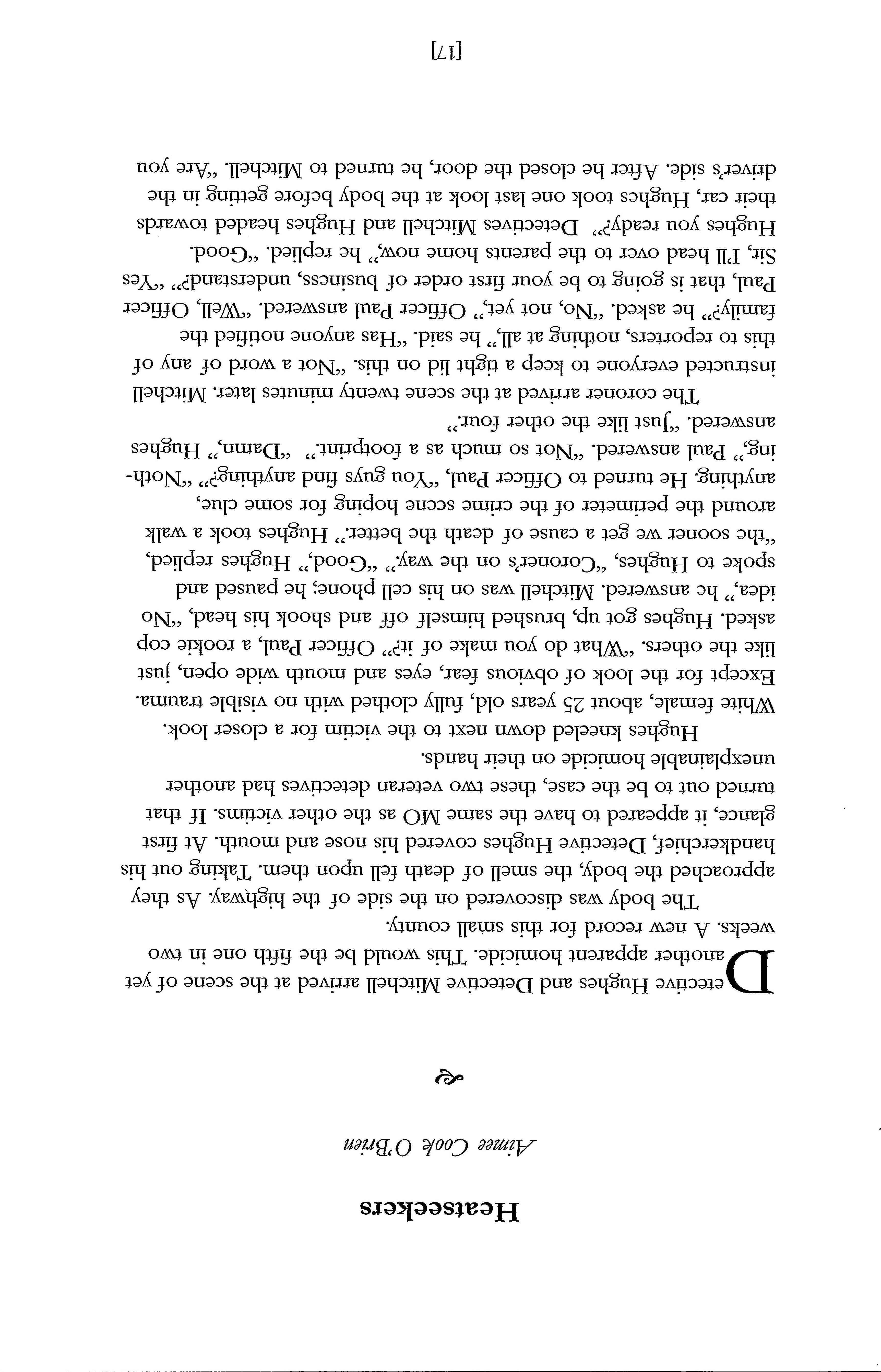
Detective Hughes and Detective Mitchell arrived at the scene of yet another apparent homicide. This would be the fifth one in two weeks. A new record for this small county.
The body was discovered on the side of the highway. As they approached the body, the smell of death fell upon them. Taking out his handkerchief, Detective Hughes covered his nose and mouth. At first glance, it appeared to have the same MO as the other victims. If that turned out to be the case, these two veteran detectives had another unexplainable homicide on their hands.
Hughes kneeled down next to the victim for a closer look. White female, about 25 years old, fully clothed with no visible trauma. Except for the look of obvious fear, eyes and mouth wide open, just like the others. "What do you make of it?" Officer Paul, a rookie cop asked. Hughes got up, brushed himself off and shook his head, "No idea," he answered. Mitchell was on his cell phone; he paused and spoke to Hughes, "Coroner's on the way." "Good," Hughes replied, "the sooner we get a cause of death the better." Hughes took a walk around the perimeter of the crime scene hoping for some clue, anything. He turned to Officer Paul, ''You guys find anything?" "Nothing;' Paul answered. "Not so much as a footprint." "Damn," Hughes answered. "Just like the other four."
The coroner arrived at the scene twenty minutes later. Mitchell instructed everyone to keep a tight lid on this. "Not a word of any of this to reporters, nothing at all," he said. "Has anyone notified the family?" he asked. "No, not yet," Officer Paul answered. ''Well, Officer Paul, that is going to be your first order of business, understand?" "Yes Sir, I'll head over to the parents home now," he replied. "Good. Hughes you ready?" Detectives Mitchell and Hughes headed towards their car, Hughes took one last look at the body before getting in the driver's side. After he closed the door, he turned to Mitchell. ''Are you

thinking what I am thinking?" he asked. "Unfortunately," Mitchell answered. "Let's get back to the department and wait for the coroner to call," Hughes said with tension in his voice.
Approximately two hours later, the coroner called. Mitchell answered the phone. The coroner confirmed that Hughes and Mitchell's hunch was correct. This victim died from hypothermia, just like the previous four victims. This just did not make sense in the middle of summer in Miami. Again, he said, the body had no defense wounds and had not been moved.
The time of death was roughly midnight. Apparently the victim died right there on the side of the road from hypothermia m ninety-degree weather. ''Thanks for the report," Mitchell said, ready to hang up. "Oh, one more thing," the coroner said, ''The victim had a chemical of some kind under her finger nails on both hands. I have sent a sample to the lab. Someone from the lab will call you when the report comes back." Mitchell hung up. Turning to Hughes, he relayed what the coroner had said. "Maybe we finally got a break," Hughes said with optimism.
"Maybe;' Mitchell said, sounding unsure. Mitchell was just beginning a background check on the victim. Hughes went to his filing cabinet and pulled out all the files that had anything to do with chemicals. The stack was small. He began flipping through them, hoping for some likeness. Without knowing what the chemical was under the victim's nails, he was hoping just to find something that might be comparable, something to go on.
At the bottom of the pile, he came across Edward Fink's file. This was a guy he had busted a few years back for mutilating animals with chemicals he had concocted. He claimed he was a wizard, testing magical potions. He had told Hughes that the animals were not dead; they were in a state of complete consciousness and would soon return in another body. He was a nut job for sure, but was he capable of murdering humans in this way? And how would chemicals come into play? The phone rang interrupting Hughes' thoughts. Mitchell answered it. He just nodded then said, "I see," and hung up. ''Who was it?" Hughes asked. ''The lab. They can't identify the chemical. They have never seen it before." "Great, another dead end," Hughes said. "Yep," Mitchell replied, "and more questions." Mitchell had just completed the background check. Nothing unusual to report. Victim number five was a waitress. Last seen at 11:00 p.m. leaving work.
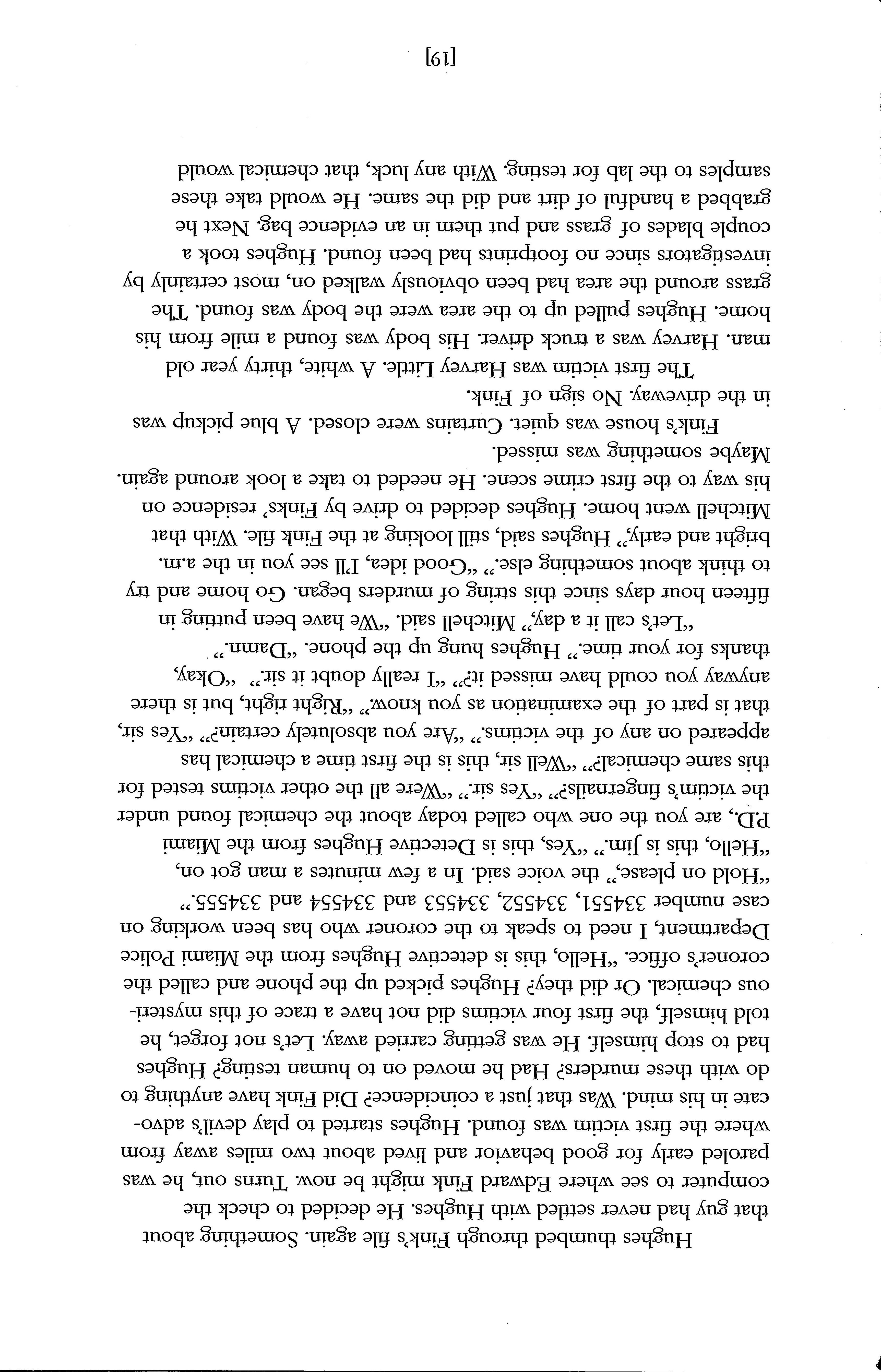
Hughes thumbed through Fink's file again. Something about that guy had never settled with Hughes. He decided to check the computer to see where Edward Fink might be now. Turns out, he was paroled early for good behavior and lived about two miles away from where the first victim was found. Hughes started to play devil's advocate in his mind. Was that just a coincidence? Did Fink have anything to do with these murders? Had he moved on to human testing? Hughes had to stop himsel£ He was getting carried away. Let's not forget, he told himself, the first four victims did not have a trace of this mysterious chemical. Or did they? Hughes picked up the phone and called the coroner's office. "Hello, this is detective Hughes from the Miami Police Department, I need to speak to the coroner who has been working on case number 334551, 334552, 334553 and 334554 and 334555." "Hold on please," the voice said. In a few minutes a man got on, "Hello, this is Jim." ''Yes, this is Detective Hughes from the Miami P.IJ., are you the one who called today about the chemical found under the victim's fingernails?" ''Yes sir." "Were all the other victims tested for this same chemical?" 'Well sir, this is the first time a chemical has appeared on any of the victims." ''Are you absolutely certain?" ''Yes sir, that is part of the examination as you know." "Right right, but is there anyway you could have missed it?" "I really doubt it sir." "Okay, thanks for your time." Hughes hung up the phone. "Damn." ·
"Let's call it a day," Mitchell said. 'We have been putting in fifteen hour days since this string of murders began. Go home and try to think about something else." "Good idea, I'll see you in the a.m. bright and early," Hughes said, still looking at the Fink file. With that Mitchell went home. Hughes decided to drive by Finks' residence on his way to the first crime scene. He needed to take a look around again. Maybe something was missed.
Fink's house was quiet. Curtains were closed. A blue pickup was in the driveway. No sign of Fink.
The first victim was Harvey Little. A white, thirty year old man. Harvey was a truck driver. His body was found a mile from his home. Hughes pulled up to the area were the body was found. The grass around the area had been obviously walked on, most certainly by investigators since no footprints had been found. Hughes took a couple blades of grass and put them in an evidence bag. Next he grabbed a handful of dirt and did the same. He would take these samples to the lab for testing. With any luck, that chemical would

reappear.
Hughes was back at the department by six o'clock the next morning. He had dropped the grass and soil samples at the lab on his way to work. Mitchell strolled in at seven. "Did you even go home?" he asked Hughes. ''Yes, I just wanted to get an early start. I went out to the scene were Harvey Llttle was found and took some grass and dirt samples. I dropped then off at the lab this morning." "Why?" Mitchell asked. "Just to see if that mysterious chemical appears. I'm working on a theory," Hughes said.
"An Edward Fink theory?" Mitchell asked.
''Well, let just say, I have not ruled him out yet. I am thinking about bringing him in for questioning." "Based on what?" Mitchell asked. "Based on the fact that he is a freak who gets his kicks from testing chemicals on living things," Hughes answered with an edge in his voice. Mitchell decided to leave it alone. He knew that Hughes had a sore spot for Edward Fink. He also knew that Fink was not smart enough to create a chemical capable of killing humans of hypothermia. It was just not possible. This guy was into battery acid and stuff. Nothing high-tech.
Mitchell sat down at his desk and started in on his pile of paper work. The phone rang. Hughes grabbed it quickly. "Miami Police Department, Hughes." Mitchell watched and listened. Finally Hughes said, "Ok, thanks." Mitchell was afraid to ask. Hughes looked at Mitchell and said, "No mysterious chemical found on the samples I took in." "Back to square one," Mitchell said, knowing they had never really left square one. Hughes just could not understand it. In all his years as a detective he had never come across a case like this, let alone five. How could there be no other evidence? No leads, no witnesses, nothing. It was driving him crazy. The phone rang again. This time he let Mitchell answer. Mitchell listened to the caller and began pacing. ''We are on our way." Mitchell hung up. ''We've got four dead teenagers in Greensville. The mother of one of the victims found them about twenty minutes ago; they had a sleepover outside in a tent."
Hughes and Mitchell headed to Greensville, a nearby suburb. When they pulled up to house, it was chaos. People standing on the sidewalks, emergency vehicles lining the street.
"How are we going to keep this from the media?" Hughes said. ''We can't let this get out if the MO is the same as the others!" "I know, I know," Mitchell replied. "I'll figure something out." Hughes

and Mitchell went into the backyard, flashed their badges and entered the tent. Still lying in their sleeping bags apparently untouched, were four white female teenagers. All had their eyes and mouth wide open. Hughes shook his head in disbelief. What in the hell was going on? Hughes left the tent and approached one of the officers. "Is the coroner on the way?" he asked. ''Yes sir," the officer replied. "Good, I want a full report ASAP." ''You got it sir," the officer answered. Hughes went looking for Mitchell. He was out in front of the house making a statement to the press. ''As of now, we have no comment," he said. Well, that will shut them up for about ten minutes, Hughes thought. Hughes decided not to talk to the victim's family; he just couldn't deal with that right now. Until he had some explanation, he wasn't going to speculate to the family. Besides, how do you tell a young girl's mother that you have no idea how, by whom or why her daughter, her friends and five other people were recently murdered?
When Hughes got back to the police department, he sat at his desk and stared at the phone. Drumming his fingernails on the desk and chewing a toothpick, his eyes rarely left the receiver. Mitchell brought him a cup of coffee and sat down. ''You alright," he asked.
''Yeh, Yeh, I'm fine, just waiting for the coroner to call," he replied.
''You know a watched phone never rings," Mitchell answered with a smirk. Hughes took the toothpick out of his mouth and threw it at him. "Thanks for the coffee," he said.
After several hours the phone finally rang. Hughes picked it up on the first ring. "Hughes," he yelled. "I mean Miami Police Department, Hughes speaking," he corrected himself.
Mitchell sat quietly watching Hughes' expressions. He could tell by the look on Hughes' face it was not good news. When he finally hung up the phone, after only a few minutes but what seemed like hours to Mitchell, he sat back down in his chair. ''Well, who was it?" Mitchell asked annoyed.
"It was the coroner. Cause of death on all four girls was hypothermia, no mysterious chemical found. Just some acetone. The girls must have been painting their nails."
''What now," Mitchell asked. "I have no idea," Hughes replied. "But it is going to be another long night," he added.
Hughes looked through Edward Fink's file again. He had a thought. Maybe the mysterious chemical was placed under the girls' nails to throw them off the trail of the real killer. But the real killer was

hypothermia. How was that possible? Hughes realized then how exhausted he was. His mind was starting to play tricks on him. He told Mitchell he was calling it a day and went home. Not straight home of course, he first needed to stop by the second and third crimes scenes. Just to be sure
The second victim was a forty-five year old black woman named Harriett Lawrence. She was the only victim so far where the family had actually called the police department and reported her missing. Apparently she had walked to the store in the early evening and never returned home. His body was found by a jogger in a rural area near the store the next morning.
Hughes approached the crime scene. He walked around the perimeter about twenty yards from where the body had lain. With his eyes to the ground he circled and circled. Nothing. Should he take in soil samples again? He decided against it. Besides, the coroner and the investigators had always been very thorough.
On his way to the third crime scene, he began thinking about all the victims. There seemed to be no commonalities. They were all different ages, different sexes, different occupations and even different races. Then it dawned on him, there was one common thread. All the victims were killed at night. The time of death was between 10:00 pm and 2:00 am. What did this mean? He immediately called Mitchell from his cell phone. "Hello, Detective Mitchell."
"Hey Mitchell, it's me," Hughes said.
"Listen I just realized that all nine victims died at night. What do you make of that?"
"I guess this psycho kills people at night," Mitchell answered. "Hey where are you anyway? I thought you were going home."
"I am, but do me a favor and get on the computer again and see if you can find any other cases were the killer only strikes at night."
"Hughes, most murders are committed at night. The moon brings the freaks out."
"You're right. You're right, I guess I am just tired," Hughes admitted.
"Go home. Get some rest," Mitchell said.
Hughes decided to get a drink at a neighborhood bar. Tomorrow he would go back to the third and fourth crime scenes. He knew he needed to unwind a bit. He parked his car at home and walked down the alley to the bar. After a few of his favorite drink, Scotch on
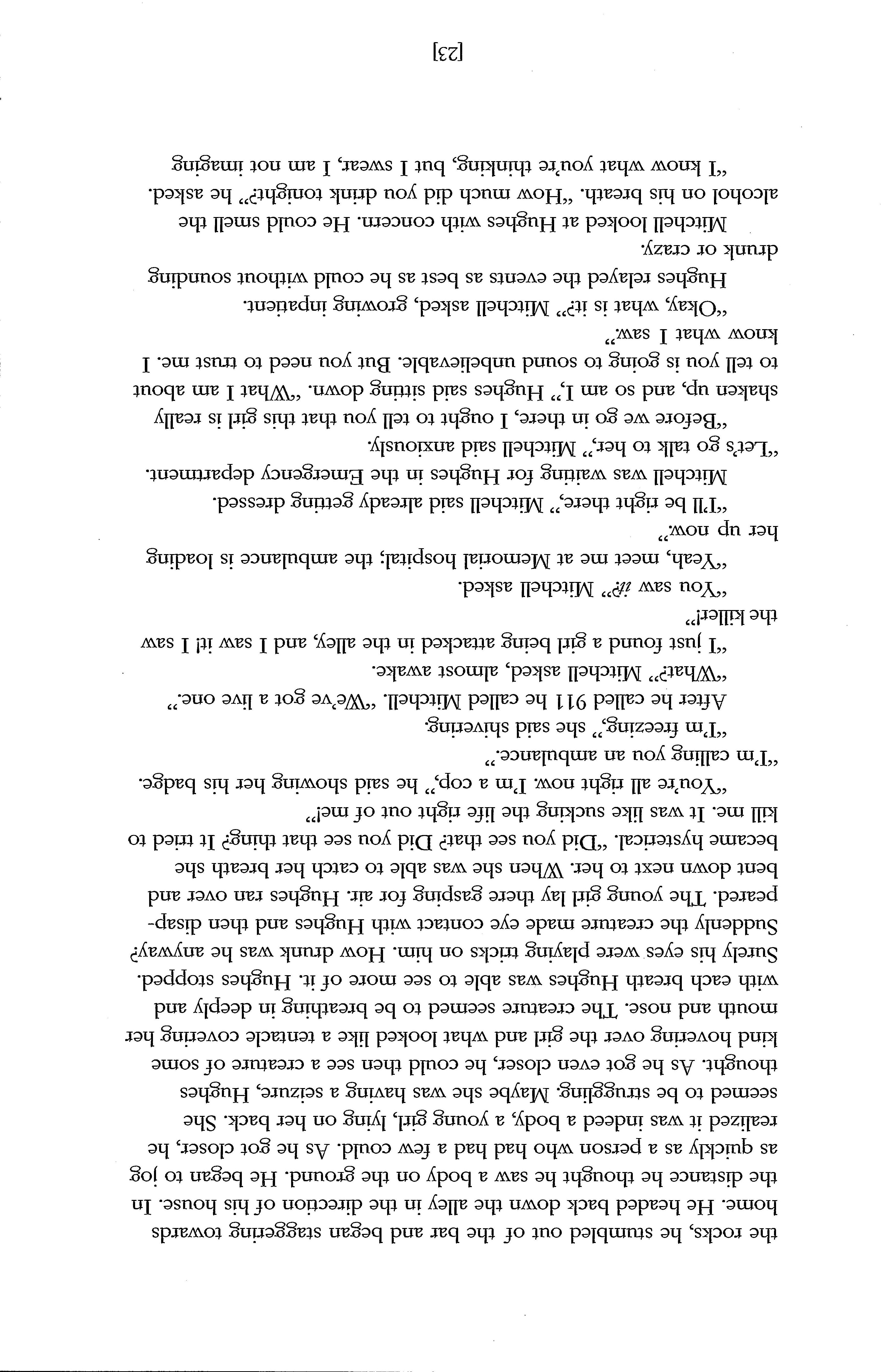
the rocks, he stumbled out of the bar and began staggering towards home. He headed back down the alley in the direction of his house. In the distance he thought he saw a body on the ground. He began to jog as quickly as a person who had had a few could. As he got closer, he realized it was indeed a body, a young girl, lying on her back. She seemed to be struggling. Maybe she was having a seizure, Hughes thought. As he got even closer, he could then see a creature of some kind hovering over the girl and what looked like a tentacle covering her mouth and nose. The creature seemed to be breathing in deeply and with each breath Hughes was able to see more of it. Hughes stopped. Surely his eyes were playing tricks on him. How drunk was he anyway? Suddenly the creature made eye contact with Hughes and then disappeared. The young girl lay there gasping for air. Hughes ran over and bent down next to her. When she was able to catch her breath she became hysterical. "Did you see that? Did you see that thing? It tried to kill me. It was like sucking the life right out of me!"
''You're all right now. I'm a cop," he said showing her his badge. "I'm calling you an ambulance."
"I'm freezing," she said shivering.
After he called 911 he called Mitchell. 'We've got a live one."
''What?" Mitchell asked, almost awake.
"I just found a girl being attacked in the alley, and I saw it! I saw the killer!"
''You saw iR" Mitchell asked.
''Yeah, meet me at Memorial hospital; the ambulance is loading her up now."
"I'll be right there," Mitchell said already getting dressed. Mitchell was waiting for Hughes in the Emergency department. "Let's go talk to her," Mitchell said anxiously.
"Before we go in there, I ought to tell you that this girl is really shaken up, and so am I," Hughes said sitting down. ''What I am about to tell you is going to sound unbelievable. But you need to trust me. I know what I saw."
"Okay, what is it?" Mitchell asked, growing inpatient. Hughes relayed the events as best as he could without sounding drunk or crazy.
Mitchell looked at Hughes with concern. He could smell the alcohol on his breath. "How much did you drink tonight?" he asked.
"I know what you're thinking, but I swear, I am not imaging

what I saw. It was as if this creature or alien or whatever you want to call it, was taking the body heat from this girl. With each breath, the creature became more visible. She just lay there, shaking a little. When the thing saw me it took off. It just disappeared. Gone," Hughes explained.
''Whoa, slow down. You really think we are dealing with extra terrestrials here? Have you lost your mind?" Mitchell said.
"I know how it sounds," Hughes said. "But you have to believe me! After what I saw, I am totally sober now!"
"Listen, before I start thinking about aliens and stuff, let's go take this girl's statement," Mitchell said.
Hughes and Mitchell entered the girl's room. It was obvious the doctors had given her some sedation to calm her down. She was still fairly lucid and able to answer the detective's questions. According to her, she was walking home from a friend's house around 12:45 a.m. She took the back alley because it was faster. She said she got about thirty yards from the house when someone or something picked her up, laid her down and then she could feel something covering her mouth and nose, she couldn't breath. Just as she was about to lose consciousness, it stopped. She looked in its eyes for a split second. She was sure it was not human. Then it took off. That is when Detective Hughes appeared. She sat up gasping for air. She felt really cold. Then she remembers being put on a gurney and into the ambulance. She told the ambulance guys what happened. They of course thought she was just in shock. So would everyone else, except Hughes.
After an examination, the young girl was taken home. The doctors said that she was not physically injured but that her body temperature had been extremely low. It had returned almost to normal when she was discharged. Hughes had taken a few swabs from under her fingernails to check for the chemical. He would drop them off in the morning.
As the detectives left the hospital, Hughes turned to Mitchell. ''Well, now do you believe me?" Hughes asked.
"Honestly, I don't know what to believe. Let's talk to the girl again in the morning. If her story is the same, well, let's just cross that bridge when we get to it."
Hughes called the girl's house the next morning to get permission from the mother to come over and question her again. Her mother said she had no recollection of what happened to her. It was as

if those four hours never existed. Hughes hung up the phone. Had he just imagined it? Was the alcohol to blame for his delusions? Did he see an extra terrestrial sucking the body heat from the girl or not? Could he ever be sure of what he saw? Was he so desperate to solve these murders that he created this scenario in his mind?
Hughes had no choice but to write the report stating the girl was extremely delusional and confused upon questioning due to the trauma of a possible abduction. He was not able to obtain a creditable statement because she had no memory of the event.
There was no mysterious chemical found on the girl, at least not on the swabs that Hughes was able to obtain. Also, there were no other homicides involving hypothermia after that incident. Hughes concluded that fear of apprehension scared the creature back to wherever it came from. Maybe it just moved on. Mitchell and Hughes never talked about aliens again. Life went back to normal in Millard County for everyone but Hughes. He was certain the creature would return someday. This time he would be ready.


My mother and I were walking with our valet and the High Chamberlain through Renaissance Square. The Queen's Walking Bell had rung. Our subjects, formerly your father's subjects, were lined along the street in their typical bowing positions-crouched low with their knees and foreheads to the ground and hands clasped before their heads. We were startled by the sound of a young man's voice, accented against the silence that commences after the bell. What our company and our accompanying guards discovered was a handsome young man with blond hair streaming down to his shoulders and deep green eyes like the ocean chastising our subjects for bowing before us.
"Fools!" hollered he. "What makes the royal family so important? Why should we bow before them? They can make us cower like animals! Is that what we are?"
The young man said many things that incensed my mother and I and the High Chamberlain. I wish I were eloquent enough to describe them all.
But I was smitten. I saw in his head, when he looked briefly at me, those big, bold, beautiful green eyes. They were at first full of fear-he hadn't known we would enter the Square and everyone bows whether we walk past them or not-but they were at once the eyes of affection, and true love. Forget whatever passion he had for his remarks against us, his flippant insults. I had been incensed, but only until I saw those eyes. I was startled by their kindness. I thought about those eyes for minutes and days and came to the resolution they held the secrets of the deepest and most permanent of loves.
If I ever despised him, because I should and because I despised his words, it's now as though I never did.
At once our guards seized this man. As he was being beaten
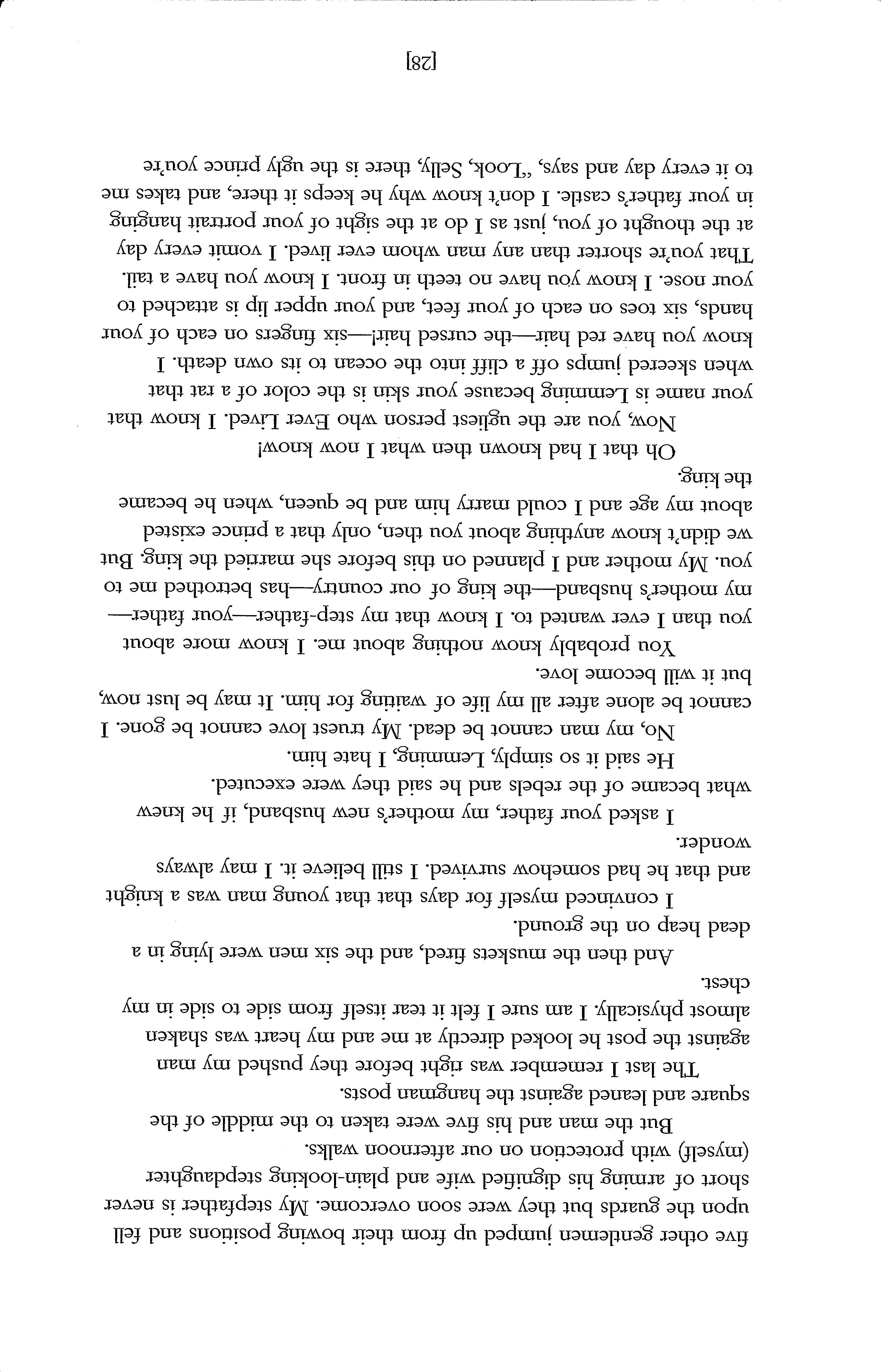
five other gentlemen jumped up from their bowing positions and fell upon the guards but they were soon overcome. My stepfather is never short of arming his dignified wife and plain-looking stepdaughter (myself) with protection on our afternoon walks.
But the man and his five were taken to the middle of the square and leaned against the hangman posts.
The last I remember was right before they pushed my man against the post he looked directly at me and my heart was shaken almost physically. I am sure I felt it tear itself from side to side in my chest.
And then the muskets fired, and the six men were lying in a dead heap on the ground.
I convinced myself for days that that young man was a knight and that he had somehow survived. I still believe it. I may always wonder.
I asked your father, my mother's new husband, if he knew what became of the rebels and he said they were executed.
He said it so simply, Lemming, I hate him.
No, my man cannot be dead. My truest love cannot be gone. I cannot be alone after all my life of waiting for him. It may be lust now, but it will become love.
You probably know nothing about me. I know more about you than I ever wanted to. I know that my step-father-your fathermy mother's husband-the king of our country-has betrothed me to you. My mother and I planned on this before she married the king. But we didn't know anything about you then, only that a prince existed about my age and I could marry him and be queen, when he became the king.
Oh that I had known then what I now know!
Now, you are the ugliest person who Ever Lived. I know that your name is Lemming because your skin is the color of a rat that when skeered jumps off a cliff into the ocean to its own death. I know you have red hair-the cursed hair!-six fingers on each of your hands, six toes on each of your feet, and your upper lip is attached to your nose. I know you have no teeth in front. I know you have a tail. That you're shorter than any man whom ever lived. I vomit every day at the thought of you, just as I do at the sight of your portrait hanging in your father's castle. I don't know why he keeps it there, and takes me to it every day and says, "Look, Selly, there is the ugly prince you're

going to marry." Why doesn't he lock that painting away, just as he's locked you away, in a castle at the edge of the world, which nobody can access without traveling so long and so far they starve to death before they get there? Be it to anyone's advantage they never see you alive, but rest their fortunate souls for they don't know what an abomination you are, Prince Lemming.
It is the perfect place for you, where nobody can look upon your hideousness. I shall never give myself to you, even if we are married one day. I shall run away, I shall defend myself against my own guards in the street and be musketted down like my love was, be that he was. I don't believe it. More, I shall find him and marry him and put you behind me like a bad dream that deserves to be forgotten. You can never be like my hero. You can never be my man. And judging from what your father says, you can never be a man at all! I hate you-I loathe you!-and I fear your grossness. God played a trick in making your father handsome, and then making you a beast. And God played a trick on me, too, letting me get betrothed to you without having ever seen you. I hate you, Lemming, and I know that that will never change. You're disgusting! You're disgusting! You're disgusting!
Dear Princess Selecca,
I have learned the identity of the young man put to death in Renaissance Square whom you mentioned in your letter. He was JeanPierre Moliere, age 25 years, known for rallying in support of countermonarchies (pre-democratic societies) in Xanadu and Camelot, also as far away as Bald Mountain. He was in our country settling gaming debts when he was taken. I am sorry about his loss. Among the men that were killed was my childhood friend and personal servant Mr. William Hendrickson, and like a brother to me, and more true to peace than to its owners. It is hard to lose those we love. But all we can do is hang onto their vision of the perfect world they sought for. That perfect world is the one in which they now exist.
I remain your loving friend,
Prince Lemming

Zulu 1-2, do you copy?" Roman stood awkwardly against the driving sand and waited for a response. After several seconds of silent static he repeated, "Zulu 1-2, this is Phoenix. Do you copy Zulu 1-2?"
Nothing.
He looked back at his companion and friend, Morton Davidson. Mort was sitting, his back to the wind. The edges of his environment suit were tattered and frayed from the consuming lick of the wind and blowing sand. His helmet visor was scarred with deep craters and a large jagged crack ran the length from top to bottom.
"Mort." Mort looked up at his commander; his eyes were blurred with the look of approaching delirium.
"I'm here boss." He smiled weakly. His hands were clenched around his shattered leg. ''Any luck?"
Roman shook his head, raised the visor on his helmet and kneeled next to his friend. ''You're not looking so good Mort."
"Not feeling too chipper, boss."
"Can you go on?"
Mort made an attempt to push himself from the ground, but he barely moved. "I'm done." His voice was brittle with fatigue.
"I can help you."
"No." Mort looked off into the distance. The blowing sand rose into a yellow-gray wall that looked impenetrable to the men. The glow of the planet's star was hazy, but its round fire was just visible through the blowing sand. "How much farther?" asked Mort.
"Twelve miles," said Roman. Twelve long miles stood between the men and their Evacuation Vehicle.
Mort nodded. ''You better get going."
Roman looked at his friend. He looked so small. Dying. "I can't leave you here to die Mort."
''You have to leave me!" Mort said, "If you don't you'll die." He

looked at the ground. ''You'll die here with me." His words were nearly lost to the rush of wind.
Roman, not listening to his friend, hefted Mort over his shoulder in a fireman's hold. He walked several feet, stumbled, and fell. Mort struck the ground hard. His leg flamed hot with pain.
''Ah shit," said Mort through clenched teeth. His wail was drowned by the banshee wind.
"Mort?" said Roman. ''You okay?"
''You have to leave me Roman. You have to go on alone." His face was pale with pain. "I'm done. I can't get to the EV, and they ..." his voice faded, and his gaze shifted to the sky.
Thry were the support team Zulu 1-2. Zulu was in orbit three hundred miles above the planet's surface, watching the expedition. They were in place as an emergency back-up to the surface team, but the sandstorm had been a surprise and came too quickly for a rescue.
The two men holed-up, but the storm outlasted their supplies and on the fourth day they were forced to leave shelter and make an attempt to reach the EV. On the second day disaster struck. Mort fell. His leg was twisted and broken. Roman dragged him to a makeshift shelter on the backside of a dune.
This morning they walked away from the shelter afforded by the dune. Roman supported his friend as they journeyed through the sandencrusted world. The men walked for seven hours, but traveled a scant one mile.
"I'm done," repeated Mort. He was deathly pale. A streak of splotchy red covered his neck where his Environment Suit was open. ''They said it was child's play." His laugh turned into a hacking cough. Roman sank down next to his friend. When the coughing ended Mort spoke again, in a raw, tiny voice. ''Assholes. They said it was an easy one."
Roman didn't speak. He clutched his friend tightly. Tears sprang from his eyes, but the wind scurried them away into the dry air. He could feel the hunger in his belly. It was ravenous and consumed his body. His limbs were cold and weak.
"We need to go Mort."
"NO!" Mort wrenched himself out of Roman's arms and shouted at his friend. "No," he said weakly. "Can't you hear me? Don't you understand? I'm going to die. Either way, I die. If you stay with me, I die, if you drag me ... I die." He looked his friend in the eye.
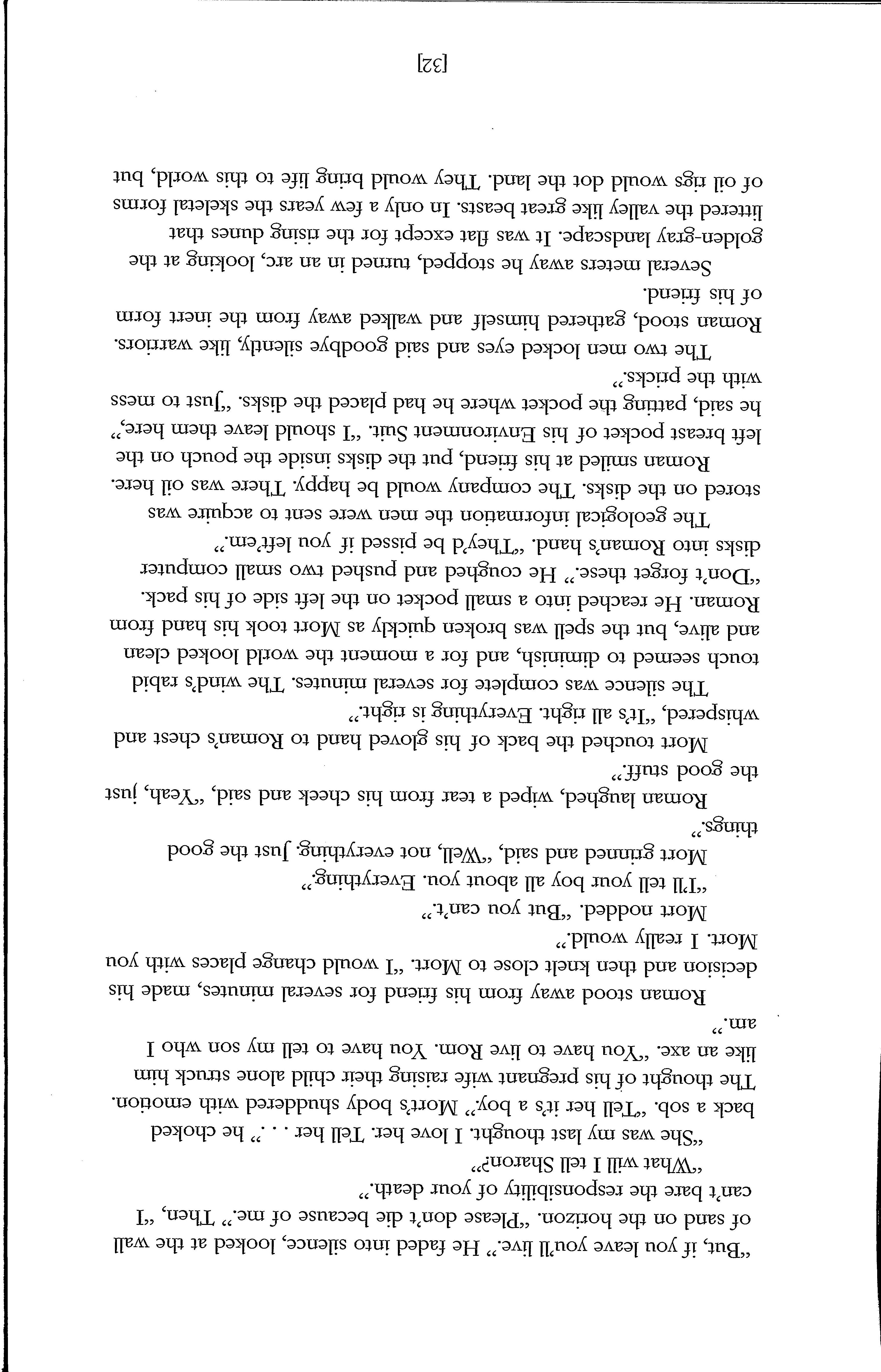
"But, if you leave you'll live." He faded into silence, looked at the wall of sand on the horizon. "Please don't die because of me." Then, "I can't bare the responsibility of your death."
''What will I tell Sharon?"
"She was my last thought. I love her. Tell her ..." he choked back a sob. ''Tell her it's a boy." Mort's body shuddered with emotion. The thought of his pregnant wife raising their child alone struck him like an axe. ''You have to live Rom. You have to tell my son who I am."
Roman stood away from his friend for several minutes, made his decision and then knelt close to Mort. "I would change places with you Mort. I really would."
Mort nodded. "But you can't."
"I'll tell your boy all about you. Everything."
Mort grinned and said, "Well, not everything. Just the good things."
Roman laughed, wiped a tear from his cheek and said, ''Yeah, just the good stuff."
Mort touched the back of his gloved hand to Roman's chest and whispered, "It's all right. Everything is right."
The silence was complete for several minutes. The wind's rabid touch seemed to diminish, and for a moment the world looked clean and alive, but the spell was broken quickly as Mort took his hand from Roman. He reached into a small pocket on the left side of his pack. "Don't forget these." He coughed and pushed two small computer disks into Roman's hand. ''They'd be pissed if you left'em."
The geological information the men were sent to acquire was stored on the disks. The company would be happy. There was oil here. Roman smiled at his friend, put the disks inside the pouch on the left breast pocket of his Environment Suit. "I should leave them here;' he said, patting the pocket where he had placed the disks. ''Just to mess with the pricks."
The two men locked eyes and said goodbye silently, like warriors. Roman stood, gathered himself and walked away from the inert form of his friend.
Several meters away he stopped, turned in an arc, looking at the golden-gray landscape. It was fl.at except for the rising dunes that littered the valley like great beasts. In only a few years the skeletal forms of oil rigs would dot the land. They would bring life to this world, but
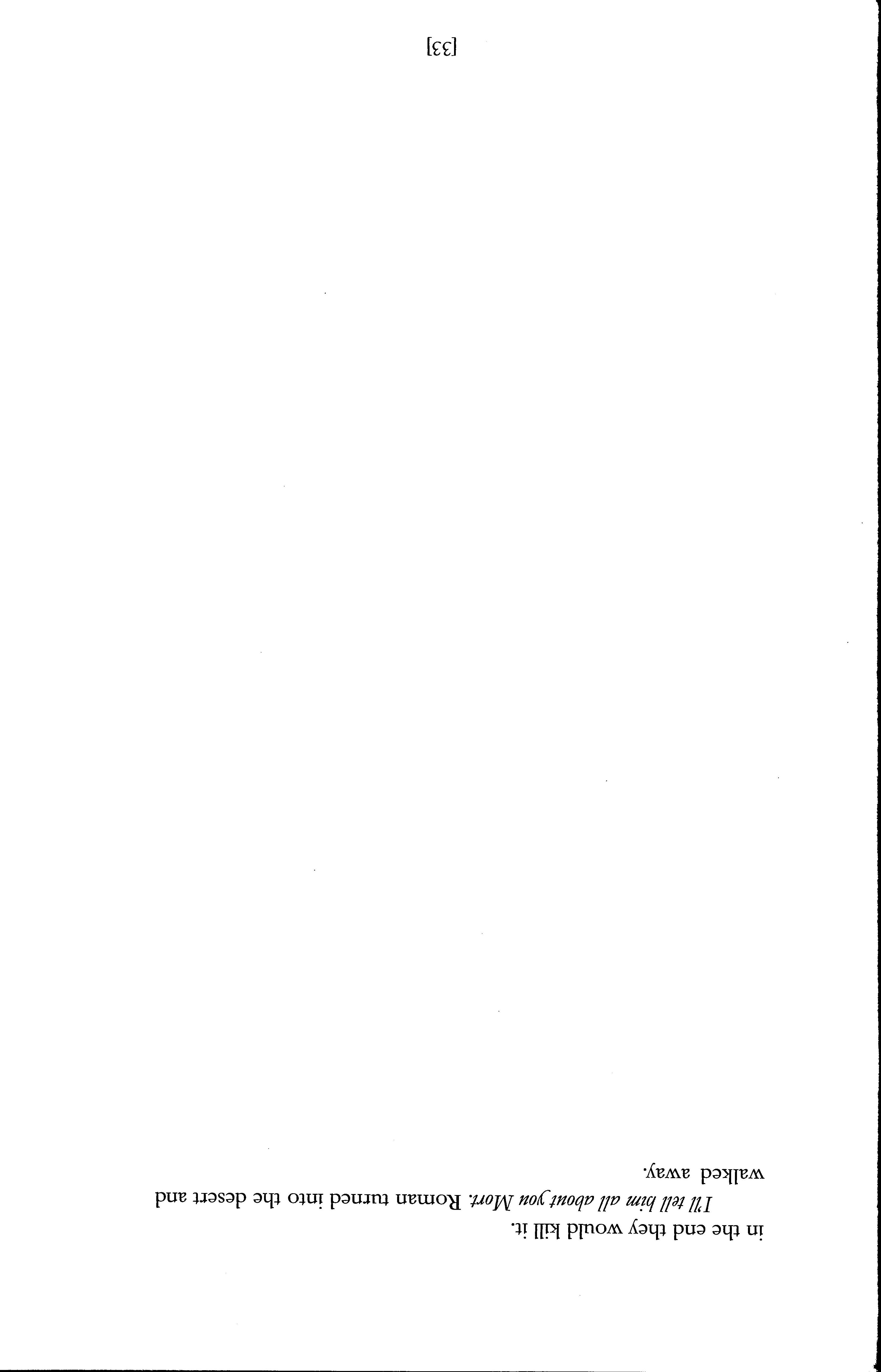
in the end they would kill it.
171 tell him all aboutyou Mort. Roman turned into the desert and walked away.

He was the irresistible Ashley Quinn. Fair haired, fair complexion, tall figure, and very pleasing address had thus labeled him. Mr. Quinn was not rich, but certainly hoped to become so. Unfortunately he spent most of his time in the pub waiting to be smitten with wealth untold. The story begins when Mr. Quinn, after flirting effortlessly with the young ladies, gracefully left the pub and walked out into London. Trying, though not needing to, he looked at his pocket watch simply to play the part of a gentleman. Pretending as though he had an important meeting to attend he strutted down the busy road to his lodgings. But on the way he had an unusual experience. Firstly, he had barely stepped onto Dansers Street when he was nearly run over by a charging Clydesdale. After being scolded by the vulgar horse owner he merely tipped his favorite top hat and headed off, nose in the air. The second instance happened just as he reached the inn. Here he was nearly flattened by a young street urchin fleeing from an angry shopkeeper. Once more he was scolded, this time for not stopping the thief. Relieved that he was home, he had barely entered the stairwell when two drunken men came fist fighting down the stairs. This time Mr. Quinn was knocked clean off his feet into a heap, his top hat smashed. With an aching body and overwhelmed mind, he collapsed onto his bed and wondered if the Grim Reaper was out to get him. He lay still for nearly five hours but found himself unable to sleep. Pulling on his coat, quickly looking in his mirror to examine his hair but failing to notice the black eye, he headed back out into London for the pub. Mr. Quinn had never been out in London at night and the sight of it startled him. But determination got the better of him. The journey back to the pub was uneventful much to his delight. He pulled up a chair waiting for the bartender. The pub was more crowded than he was used to.
"Mister Quinn! Aye Quinn! I knows its Quinn!"

He turned to see a dirty, unrecognizable, face.
The chap had frizzled gray hair and beard. "I am yer humble Ian McCorkle! Always sir, always! Never thought to see you here, Quinn. Never! Would have bet me life on it!" McCorkle chuckled through broken yellow teeth.
Mr. Quinn had not yet given up hope on being a gentleman and addressed Mr. McCorkle in such a way. "My deepest apologies, sir! The name McCorkle is not fresh on my mind."
McCorkle laughed heartily for two minutes then couldn't talk.
Quinn glanced around him wondering whether he should consider escape.
Five minutes had gone by before Mr. McCorkle's voice had returned. "Oy, there Quinn! You never been better! Never been better! Always thought so! Always thought so! Never fancied meeting you here! No sir! Not one bit!"
Quinn wanted desperately to be free of this odd man's company. ''A pleasure it has been in seeing you again." He rose from the table.
McCorkle grinned and lifted Mr. Quinn's empty glass in salute. Quinn nodded and hurried for the door, reached for the handle, but the door flew open on its own accord and with such force all the candles in the room went out. The blackened room became deathly quiet.
Mr. McCorkle broke the silence. "Oy, what a wind, mates!"
Suddenly a lamp swung into Mr. Quinn's face. Behind it was a boy of nigh seventeen. Underneath the hood of a tattered cloak the boy's black Celtic hair hung unkempt. A sneer was on the lad's face. "Mister Ashley Quinn." The boy spoke hoarsely. Quinn was too shocked to move. He felt a chill creep down his back just by staring at the boy's large, cold, gray eyes. Just below the boy's chin he saw the light of the lamp reflecting off a glint of metal that looked remarkably like an axe. Suddenly he felt himself sink to the floor.


Barefoot girl
Soaked in the numinous sun
Waits for a cumulus cloud to pass by A brisk breeze
Flows through her field of Freedom-blue sky
Where she lets her thoughts fly
Her head is heaven bound
Mind kite not letting down
In a sea of grass
I see her feet
Make love
To the Ground


First and last think, keep talking
New Tuesday, my Wednesday, keep thinking
File away broken pessimism
Clear away a space to listen
Always underneath, but always precious Reality
Not that it would ever go away, but how far ahead can you think outside this year, this galaxy, this existence
I dreamt of seagulls overhead ... 3 all in a row, but each a little higher and I sang while they flew, they listen as I watched in that space silent for listening
I blinked and they whispered I flew as they listened I found the edge of Now touching weary, but touching still the lines disappeared
I looked shallow
I looked deep took in all the beauty and watched myself calm down Calmer, to slower, to still, Until I disappeared
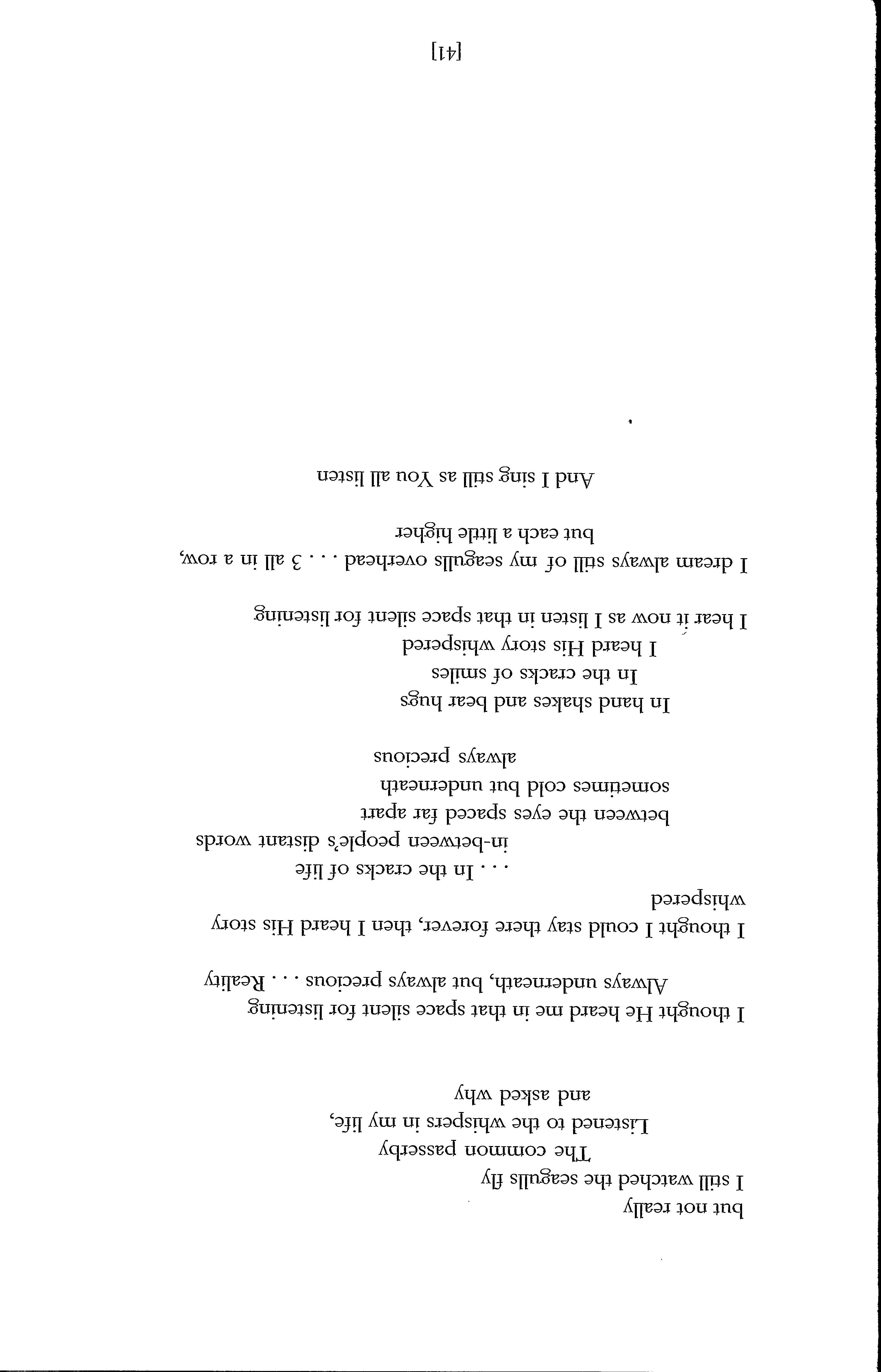
but not really
I still watched the seagulls fly
The common passerby
Listened to the whispers in my life, and asked why
I thought He heard me in that space silent for listening Always underneath, but always precious ... Reality
I thought I could stay there forever, then I heard His story whispered
In the cracks of life in-between people's distant words between the eyes spaced far apart sometimes cold but underneath always precious
In hand shakes and bear hugs
In the cracks of smiles
I heard His story whispered
I hear it now as I listen in that space silent for listening
I dream always still of my seagulls overhead 3 all in a row, but each a little higher
And I sing still as You all listen

An oversized dishrag made especially for drying, waits patiently.
I scope around for her and with a soft, warm grasp, we join parts to be one assemblage.
Melting bubbles with each new dive into a pool of unknown. Sounds of clanking and plunking and rinsing. Dipping again into the warm abyss never knowing which piece we will find next.
Gently, we pick up dishes of the day. A spoon from breakfast of shredded wheat, the bowl from lunch.
These knives are our favorite. We slide together over the smooth, slicing surface. Being only careful enough not to cut each other. Expose.
Holding her still beneath the warm blanket I use my left hand to rinse from each piece the tiny opalescent bubbles

we have together created.
Washing,breathing, remembering meals of the day.
Slowly, bits of food, of sodden cheese, and a sorry cigarette butt reveal themselves.
The water now an honest, dingy tinge.

I weep for lost, dark, hidden treasure gleaming under the silt of clearly remembered forgotten years.
I cry for buried things-glinting jewels plunged under the must of wispy dreams and shadowy smiles.
I wail for would be precious, shining things that slipped beneath the murky waters of what might have been.
I anguish aloud at the slippery, unattached fingers that let these bright things slip through their foolish unclasping.
I rage at the ignorant, careless feet that trod upon them unaware.
I silently weep for these precious, shining things as they turn and slip deeper into their graveunquiet and covered over with the brittle tendrils of the remorseful vines of yesterday.

Desert sand wisped by a foot path. The wind through juniper branches Moving like a mime.
Smoke rising from tea-sized leaves. Thick, gray and perfumed like A desperate sea of a drowned past.
This land is barren and ghostly, So much spiritHere.
This land is not swollen but whole. I find my primate in the dust Rising to the sky.
The sticky heat smoldering my skin. My eyes blazed from the bold resonance Of the sun.

After dark, Lle down on the cool wet lawn In your front yard
And let the blades of grass dance with your feet And tickle you; neck And curl your toes around it
Like cool wet sand on a beach
And the soothing lights coming from your house shine through the front window and join the assembly of a thousand lights a million miles away
And it makes you feel sanctuary to hear the sounds coming from your house, Your mother washing dishes
Your sister watching TV
Your neighbor in his garage crafting familiar sounds of the industrial world downtown
Of a welder grinding against metal
Of clanking and slamming and burning It makes you feel an awesome wonder
And humility
To hear
To watch the creations of a thousand universes
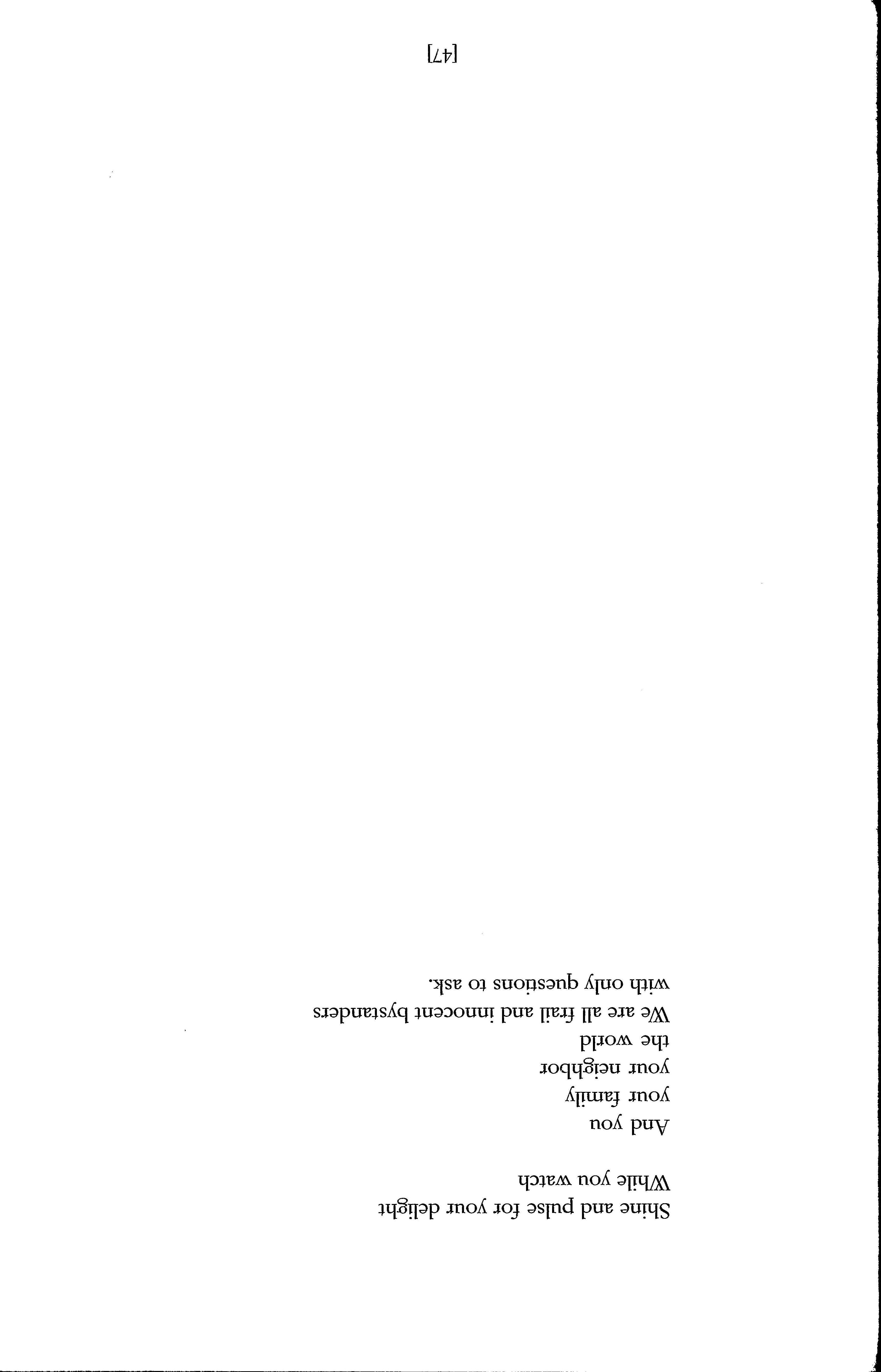
Shine and pulse for your delight
While you watch
We are all frail and innocent bystanders with only questions to ask.
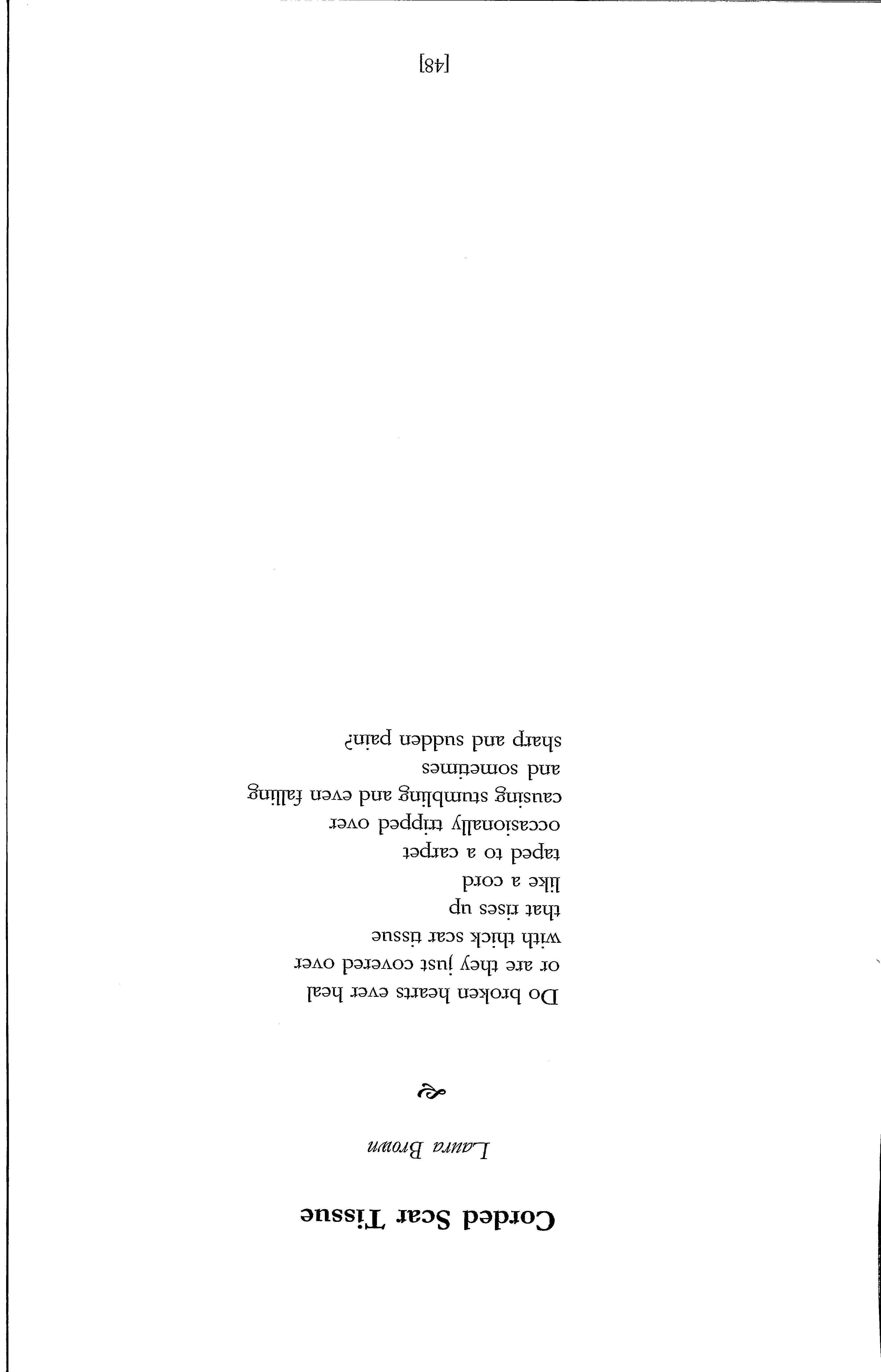
Do broken hearts ever heal or are they just covered over with thick scar tissue that rises up like a cord taped to a carpet occasionally tripped over causing stumbling and even falling and sometimes sharp and sudden pain?

Bill and Will stepped out, to greet the wonderful day, a day just right for fun, a day just right for play.
The birds were singing songs, for the happiness they yield, as Mr. Wind danced around, the daisies in the field.
Then Will and Bill decided, to head on up the street, to the little corner store, so they could buy a treat.
As the two boys walked along, the winding country road, they heard the cheerful croak of a happy little toad.
Bill moved aside a branch, and was so glad to see, not one, but two brown toads, beneath an old oak tree.
The toads were taking turns, croaking to each other, like a sister to a sister, or a brother to a brother.
"Those toads are twins," Bill said, ''And I really think it shows. From the bumps on their heads, to the webs of their toes."
The two boys headed onward, but it wasn't very long, before they met two blue birds, singing a sweet song. Will and Bill then stopped, to smile and say hello.
So the cheerful little birds, gave a special show.
"Those birds up there are twins," Will then went on to say, ''And they're the second set of twins we've seen today."
Then, just below the birds, in a dark and shady place, Bill found a pair of snails, having themselves a race.
The boys just had to wonder, before they walked on past, "Is this to see who's slowest, the winner comes in last?"
Then Bill looked at his brother, and shouted out with glee, "Those two small snails are twins, so now we have seen three!"
The boys then started searching, for other twins to spy.
They searched down on the ground. They searched up in the sky. While passing by the window, at the front of the corner store, the

boys looked in the glass and said, "Now we've just seen four!"
Bill and Will were right, and that could not be clearer.
"For us to see we're twins," Bill said, "we must look in a mirror."

why stand troubles
helpless over hope
childlike in theory
childish talk among adults
the withered walk
bare feet to ground blind ignorance
still kept dance
those who see spare troubled eyes
those who hide new evil introduced to tranquil sights untouched and tainted

passing GO a hundred times
letting lose festered troubles
leaving seat, it's lunch time
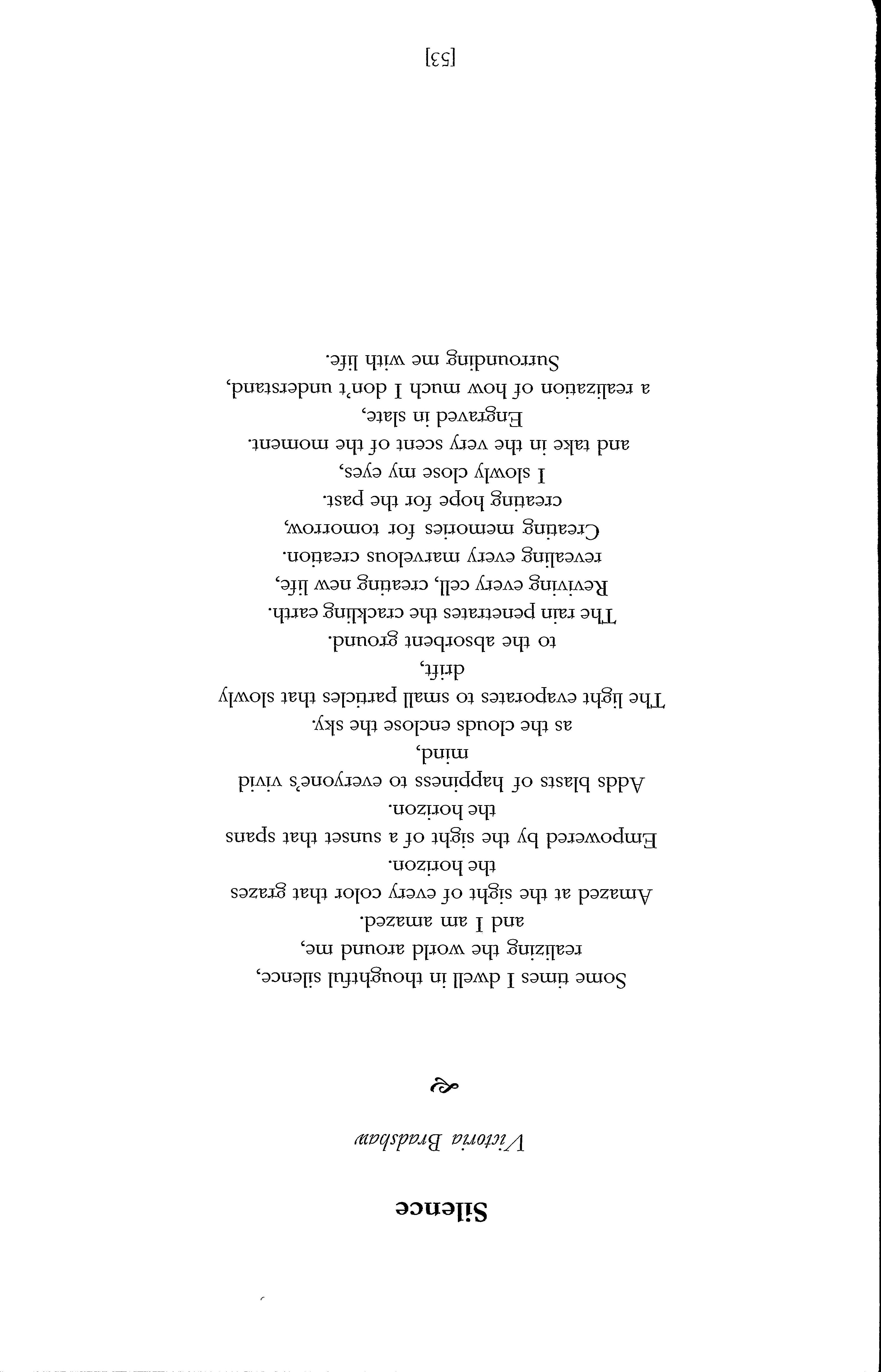
Some times I dwell in thoughtful silence, realizing the world around me, and I am amazed.
Amazed at the sight of every color that grazes the horizon.
Empowered by the sight of a sunset that spans the horizon. Adds blasts of happiness to everyone's vivid mind, as the clouds enclose the sky.
The light evaporates to small particles that slowly drift, to the absorbent ground.
The rain penetrates the crackling earth. Reviving every cell, creating new life, revealing every marvelous creation. Creating memories for tomorrow, creating hope for the past.
I slowly close my eyes, and take in the very scent of the moment. Engraved in slate, a realization of how much I don't understand, Surrounding me with life.
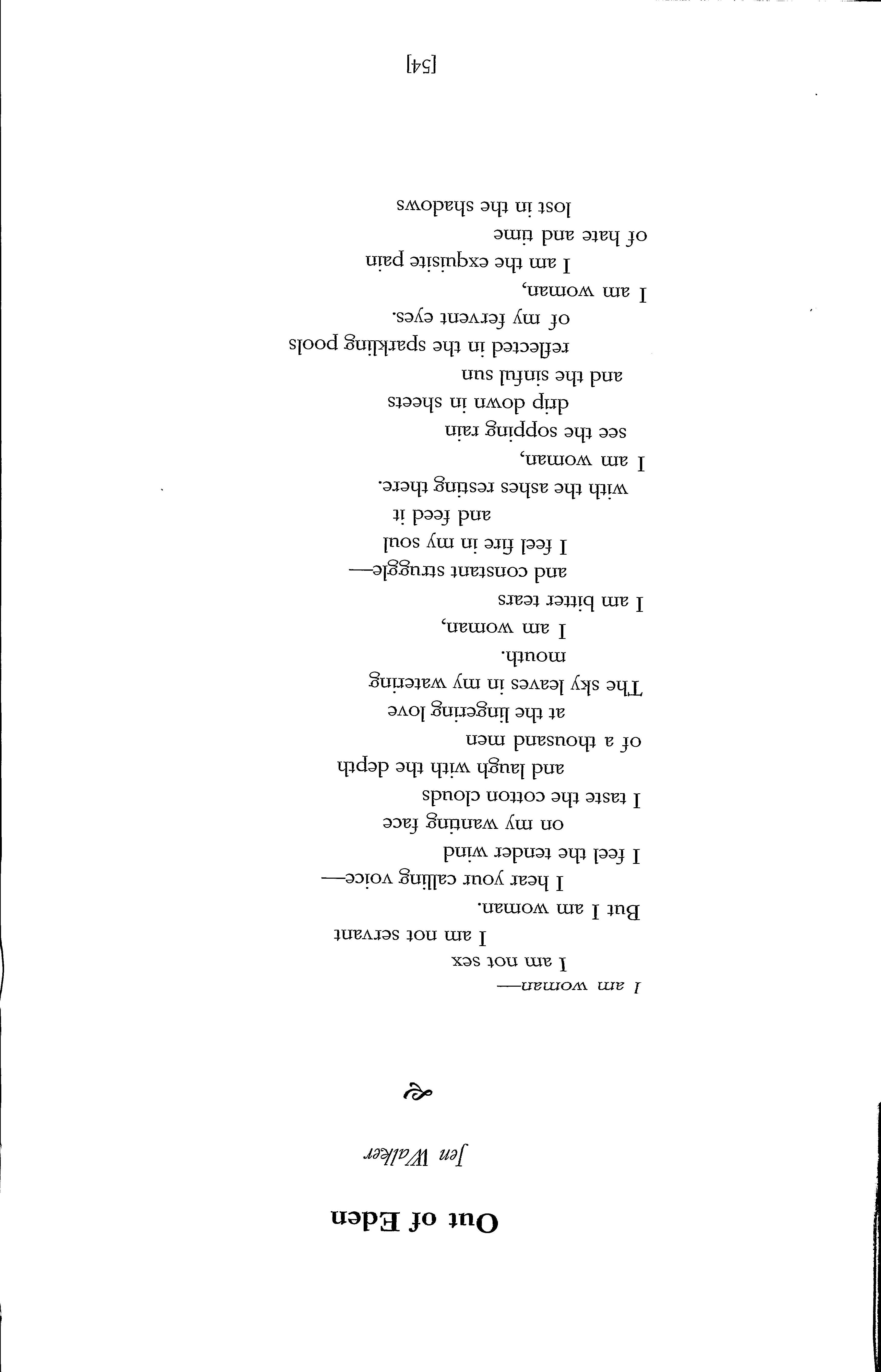
1 am womanI am not sex
I am not servant But I am woman.
I hear your calling voiceI feel the tender wind on my wanting face I taste the cotton clouds and laugh with the depth of a thousand men at the lingering love The sky leaves in my watering mouth.
I am woman,
I am bitter tears and constant struggleI feel fire in my soul and feed it with the ashes resting there.
I am woman, see the sopping rain drip down in sheets and the sinful sun reflected in the sparkling pools of my fervent eyes.
I am woman, I am the exquisite pain of hate and time lost in the shadows
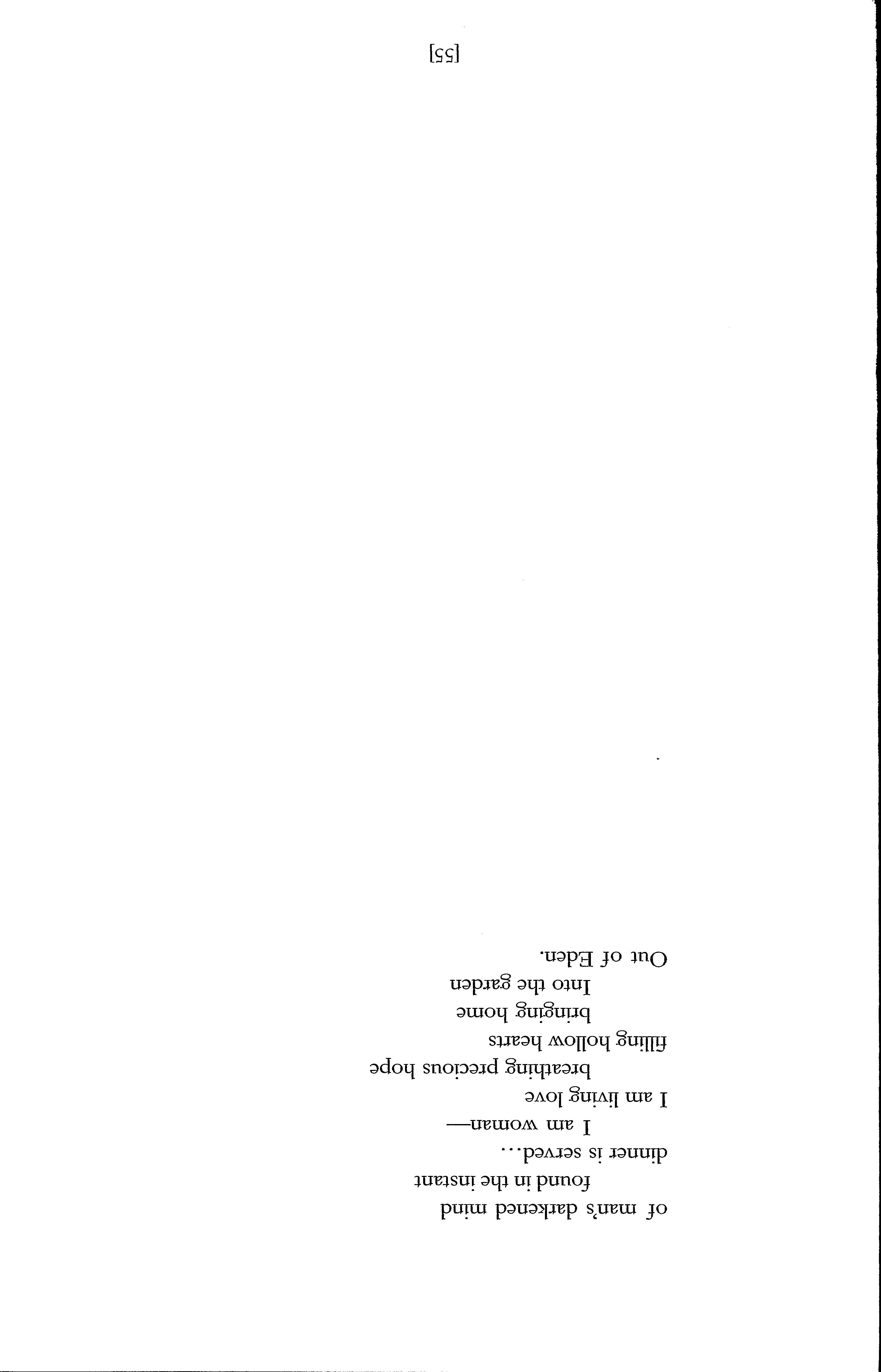
of man's darkened mind found in the instant dinner is served ...
I am woman-
I am living love breathing precious hope filling hollow hearts bringing home Into the garden Out of Eden.

wind blows down upon us like whispers of giants, rushing, limbs of trees move as we move, dancing, upon the shadows left by the moon.
this feeling so intense, this embrace embrace of sound and shadow, and us.
look how emptiness leaves! clothed in mist and darkness.
feel, feel the dread exit us with these whispers of giants, let these same whispers rage and roar around us, resounding our passions that we may fall into each others arms, and discover the reflection of our choice.

The first sights and sounds of morning awaken me from sleep.
The warmth of the sun on my face,
The birds singing in the air, The presence of others, stirring. I lay quietly for a moment, Only moving to breathe, Taking in the sounds of life.
While my eyes begin adjusting to the light, I rise and ponder these thoughts.
What will today bring? Whose life will intersect with mine?
Will there be sadness or joy, and will I have the wisdom to know the difference?
Will I make the most of this fresh beginning, a clean slate in which anything is possible?
Eagerly awaiting the chance for the answers, I am ready, To take on the day.


Midnight is a girl's worst fear, those terrifying dreams and recollections: A wool blanket, springs of the bed Tearing into her skin. She sucks blood from her fingers, Waiting.
Chattering teeth in the dark
Sounding to her ears like ten-thousand Armies, secretly praying that the noise will stop!
Heels batter the plank-wood Floors. Hitler's marching possessions Drag the screaming away.
Clawing shadows bring the nightmare coming. Fire your arms for submission and sentence! Machines made to kill and not to reason. They swarm-these modern nests breeding cloned Wasps.
The neighbors see the storm, nacht after nacht. Quietly, they are watching from their window panes; post-Curfew. Grimm Brothers Live draining bloody heads upon the sidewalk. Corpses folding of the once Living. Gracefully like doves bathed in red; red rivers gently spilling steam into the cold pierce of winter. Yes, they sense it deeply. It is a person they once knew, maybe even talked to everyday. They no longer recognize their human faces.
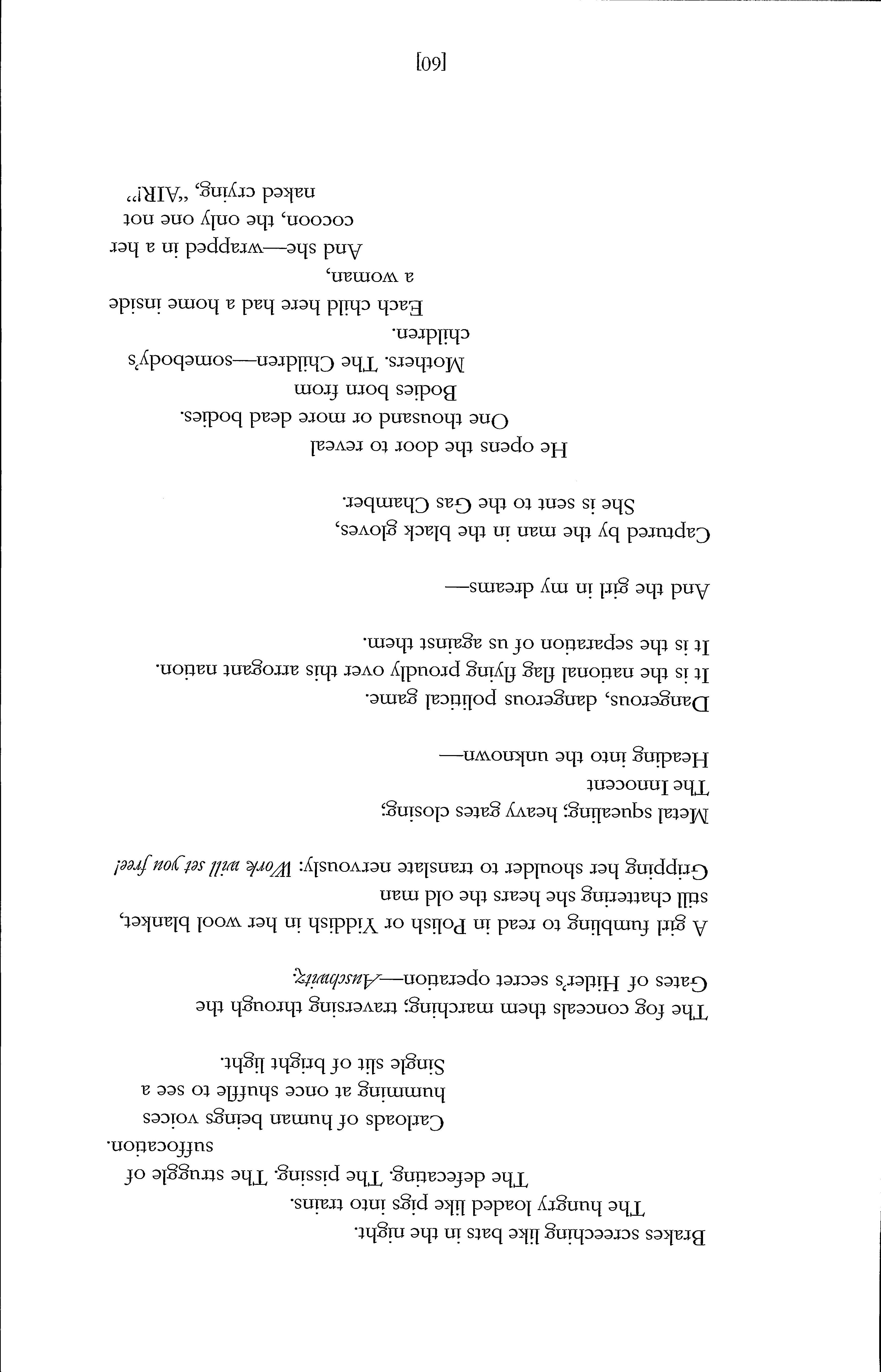
Brakes screeching like bats in the night.
The hungry loaded like pigs into trains.
The defecating. The pissing. The struggle of suffocation. Carloads of human beings voices humming at once shuffle to see a Single slit of bright light.
The fog conceals them marching; traversing through the Gates of Hitler's secret operation--Auschwii:z:
A girl fumbling to read in Polish or Yiddish in her wool blanket, still chattering she hears the old man
Gripping her shoulder to translate nervously: Work will setyou .free!
Metal squealing; heavy gates closing;
The Innocent Heading into the unknown-
Dangerous, dangerous political game.
It is the national flag flying proudly over this arrogant nation. It is the separation of us against them.
And the girl in my dreams-
Captured by the man in the black gloves, She is sent to the Gas Chamber.
He opens the door to reveal One thousand or more dead bodies. Bodies born from Mothers. The Children-somebody's children.
Each child here had a home inside a woman,
And she-wrapped in a her cocoon, the only one not naked crying, ''AIR!"

It lies beneath the willow tree.
It walks along the sand-strewn shore.
It sits upon the wooden bench.
It dances on the ballroom floor.
It makes the timid do things bold.
It makes the foolish do things rash.
It makes the thoughtful do things sweet.
It makes the selfish do things brash.
If woken ere the time is right,
It can arouse much grief and pain.
If found inside the perfect one, Your life will joy and gaiety gain.
Some say they've found what all have sought, And yet their failure is not told.
Be positive you've found what's real. Make sure you've not just found fool's gold.

The gentleman sets his target, Swings upon me with his intense, burning, desirous green eyes, Settles overhead for one forceful second, before Effortlessly cascading beyond
Not unlike cottonwood fruits in spring, Though he only falls where needed, never scattered, No gaps, He's never had to regain control, Or search for words,
On account of failing reserves. He just moves on to another target, Rendering control over the play in which he lives, and Puppeteering the folks who follow him, Folks who never squabble,
Never talk back.
For, as he glazes over them with his intense, burning, desirous green eyes, Ladies want nothing more
Than to service the man Of questionable legality, who will always emerge upright and honorable; He wins every game.
It's money and women he plays, and both are of minimal importance once they fill his pocket.

An ancient architect
Designs an intricate masterpiece.
Creation's fingertips placed upon eternity
She performs her clockwork unceasingly.
Speaking softly, but with conviction
Her lips never utter a biased thought.
A guru of forgotten philosophies And archaic dialects.
Her sacred concertos
Welcome the morning with melodious rhythms
And sweet lullabies
Euphoric hymns sing praise to unity
A champion of conflicts
She cultivates peace through order and chaos
Slinging paint upon the canvas
Of consciousness
April Coulam
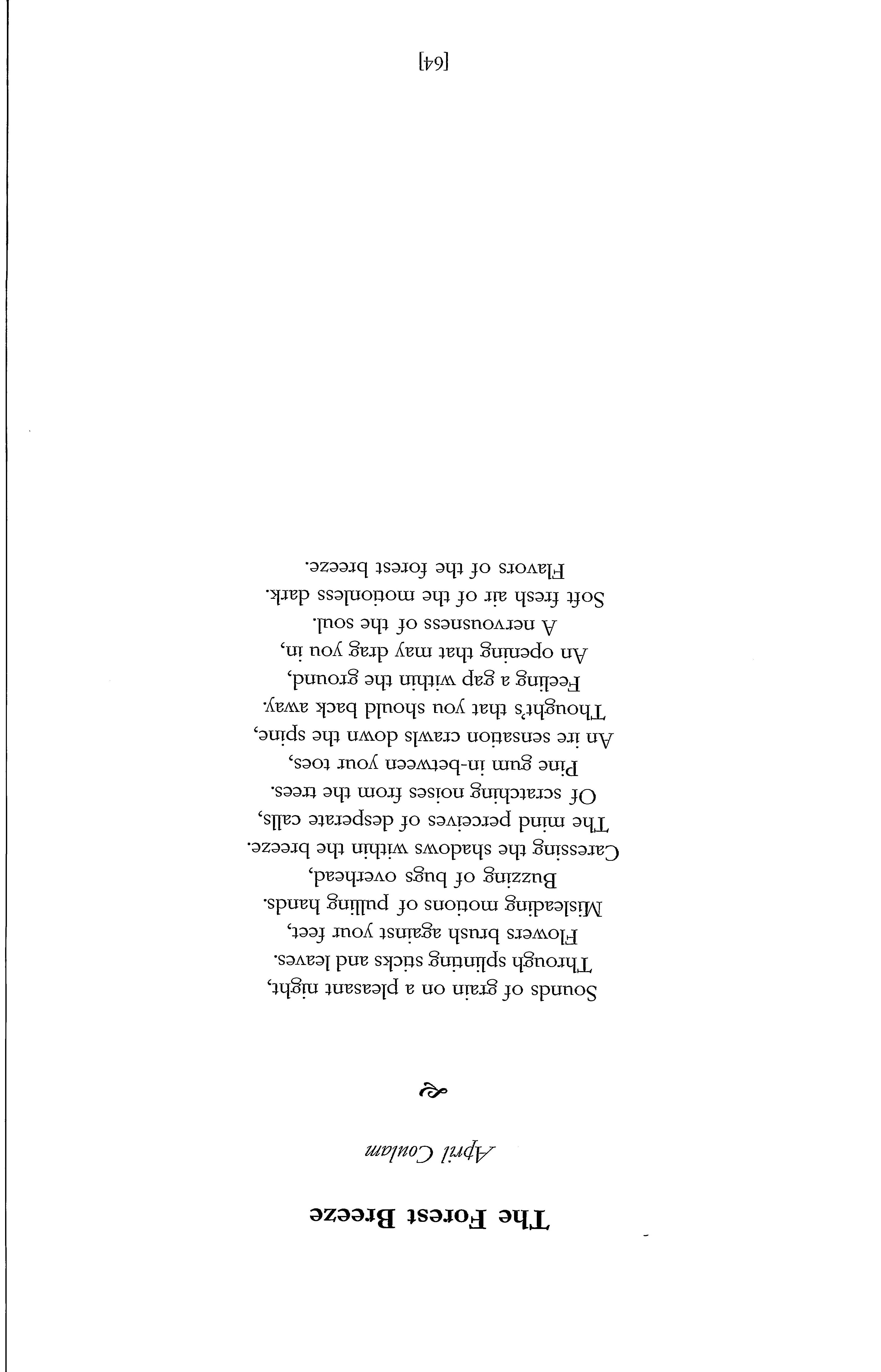
Sounds of grain on a pleasant night, Through splinting sticks and leaves. Flowers brush against your feet, Misleading motions of pulling hands. Buzzing of bugs overhead, Caressing the shadows within the breeze. The mind perceives of desperate calls, Of scratching noises from the trees. Pine gum in-between your toes, An ire sensation crawls down the spine, Thought's that you should back away.
Feeling a gap within the ground, An opening that may drag you in, A nervousness of the soul.
Soft fresh air of the motionless dark. Flavors of the forest breeze.

The left is expression, the right
Silence
The scars are real, physical
Marking my time, years on this earth
Never to express the beauty
Failings of life, truth of pain
Not physical
Lessons not learned
The left was damaged, stunted Showing the physical of the energy, The mind
Tangible reminder of things to come Events, energies, ideas, not acknowledged Affected the body
Who knew energies had conspired
Against me, for me
To manifest in my wrist?
Tarnished purity, clarity
Smoke signals unheeded

I come upon them out of the silence.
Llke a choir they stand in perfect harmony. Do they notice my presence?
I wonder, "How far am I off key?"
Minutes, Hours, Days, Weeks, and Years of practice. Their music speaks more than a thousand words. I wish to communicate like them.
I pass beneath their artistic expression. How fitting.
Can I rise to match this vision of beauty?
Willingly my heart is branded by this place and time. A thread to this spot that can never be broken. As I am swallowed up by the night I look forward to another fleeting moment, That will live in me Forever.
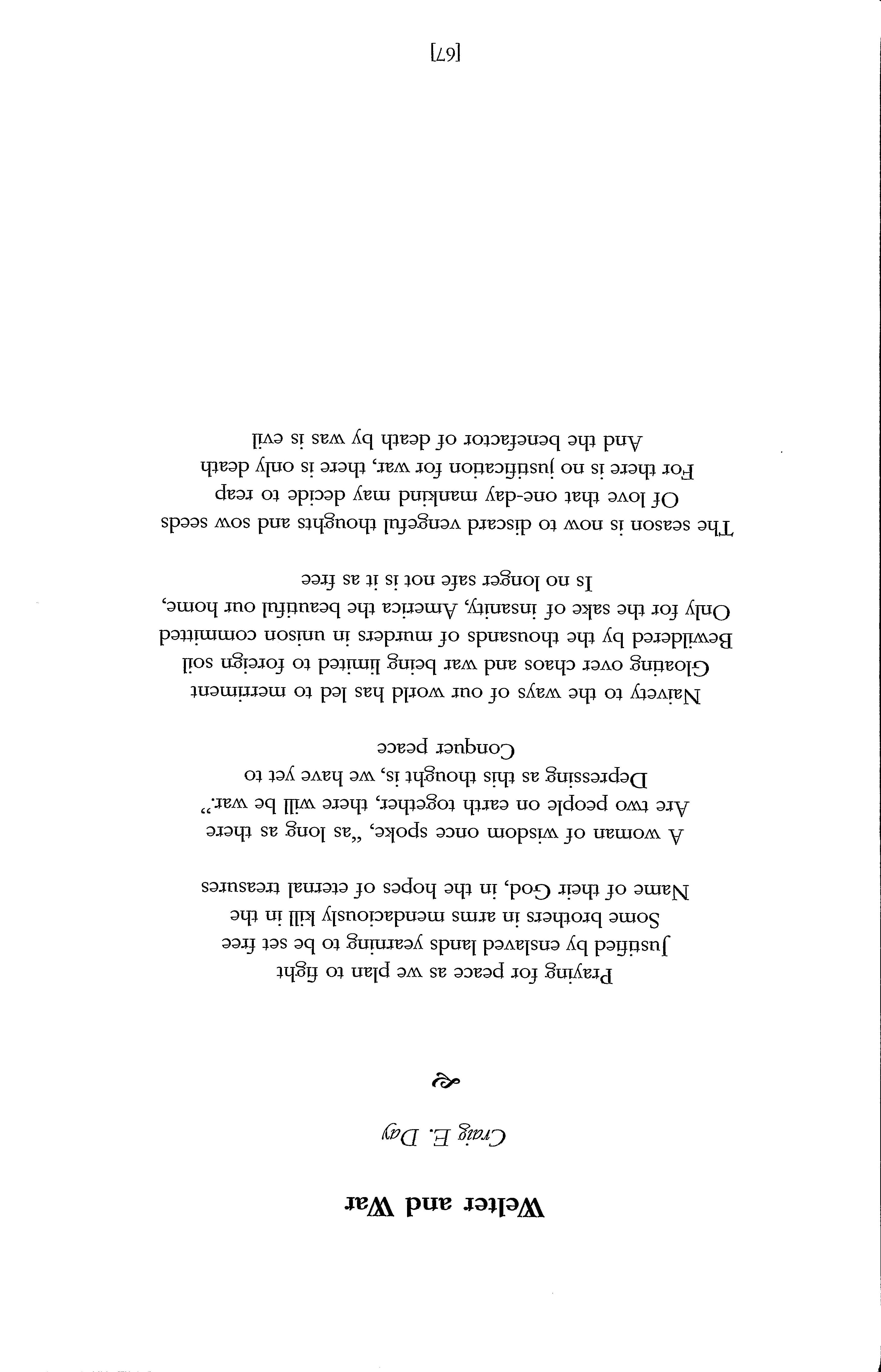
Praying for peace as we plan to fight
Justified by enslaved lands yearning to be set free Some brothers in arms mendaciously kill in the Name of their God, in the hopes of eternal treasures
A woman of wisdom once spoke, "as long as there Are two people on earth together, there will be war."
Depressing as this thought is, we have yet to Conquer peace
Naivety to the ways of our world has led to merriment
Gloating over chaos and war being limited to foreign soil
Bewildered by the thousands of murders in unison committed
Only for the sake of insanity, America the beautiful our home, Is no longer safe not is it as free
The season is now to discard vengeful thoughts and sow seeds Of love that one-day mankind may decide to reap For there is no justification for war, there is only death And the benefactor of death by was is evil

Dedicated to Ray Bradbury: Farenheit 451
My words
Surrounded by crystallized censorship Coming from your mouth like cotton balls doused in kerosene, Bursting to life by the fire in their looks. Retaining their color through their charred bodies smoldering away without ever really dissolving.

DISCERNING POETICS is seeing the man on the bus and putting yourself in his dignified shoes,
Old, worn out tennis shoes that have traced nameless trails and walked on paths unknown to you
DISCERNING POETICS observes the faces in every car that is passed on the freeway and every clerk who is fixing your two- fisted burrito at Taco Bell, It has a story for every life and a question for every face
And something to learn from everyone. And it wonders what they know that you don't and it wonders if you're ever going to learn it or experience or figure it out.
DISCERNING POETICS believes that a person chooses where they want to be in life Regardless of race, creed or color Because we all make our own destinies, our destinies don't make us.
DISCERNING POETICS knows that there are exceptions to every rule and that the starving people of Africa have not chosen their destinies and those dying of cancer don't choose a life of suffering but that it has been cast upon them by

a power greater than themselves or destiny it seems.
But it will all be made right in the end. Because DISCERNING POETICS believes in a malicious world but never in a malicious God.
DISCERNING POETICS believes that America casts nothing on anyone. We live in a free countrynot because of the ACLU.
DISCERNING POETICS believes that "fate" is what we can be, Not necessarily what we are.
DISCERNING POETICS looks out the window of every room.
DISCERNING POETICS is hiking as far as you can on every trail.
DISCERNING POETICS does not believe that man is an island, But rather, that when a man dies he never dies alone.
DISCERNING POETICS is about what you make of yourself, Not what others make of you. It is optimism. It is Mary Oliver's circular hope. Like Santa it is spoken into life.
It is the baby boy on the bus
Smiling and happy as he prepares to Play with his Tonka Truck and one day Trade it for a pair of old tennis shoes And it doesn't make us sad But rather it makes us smile Because we have all been there And we will all GET there.



Do you fall for advertisements? Have you ever run out and bought an item due to something you read in a magazine? Let me help you to rethink your next purchase due to an advertisement.
Have you ever flipped open a magazine and read the advertisements, and then read through the beauty tips or any other tips offered by magazines? If you pay close attention you will find that many of the items suggested are also advertised in the magazine. I always found this quite suspicious, being as this usually persuaded me to run to the store and purchase the item suggested. If Seventeen recommended it, it had to be good. My whole view changed when I read an article by Gloria Steinem called "Sex, Lies and Advertising."
Steinem, who worked for a magazine called Ms., found that advertisers demanded that an editorial be written about their product they are advertising. She found that without the supporting article she couldn't get anyone to advertise with Ms. She also found that because Ms. was a women's magazine, many of the "manly" items like cars and electronics, wouldn't advertise in their magazine because they felt that ''women pick out the upholstery while the men chose the car." Steinem became frustrated with these companies and tried to argue that many of their reac:lers were working women, who earned their own money and bought their own things. The companies argued that these women ask their boyfriends or their husbands what brand to buy, rather than make their decisions on their own. Steinem argued back that they just needed to be educated on technical terms and how to differ one brand from the other. The companies replied that it wasn't worth their time and money to comply with her requests. Steinem ended her article by stating that their magazines intent was destroyed due to the advertisers' requests, and Ms. fell into the company's demands in order to receive advertisements, and to have the funding needed to run their magazine.
After reading this article I have found myself looking over the

advertisements first, and then reading the beauty tips. I read with a black marker in my hand and cross out each of the items they recommended that is also advertised in the following pages of the magazine. I then started to ask if they were paid to recommend their other items with out an adjacent advertisement or if they really are a good item. I can't trust the magazines anymore and I won't renew my subscriptions.
All this because they are forced to comply with the advertisers' requests or else they won't acquire the funding they need to continue to operate.
There are many different types of advertising: clothes, appliances, electronics, and other gratifying things. Cigarettes seem to have the most controversy surrounding them when it comes to advertisements. They are unhealthy, addictive, and hurt others through second-hand smoke. There are many different ways the tobacco companies advertise their brands. One is through magazine ads while the other is through role models we find in music and in movies. Two examples that come to mind depicting these forms of advertising are Stephen Bean's ''A Tale of Two Advertisements," and Dr. Gina Escamilla, et al's ''Women Smoking in Movies."
In Stephen Bean's article, ''A Tale of Two Advertisements," he describes the different images presented by two ads for cigarettes. The first shows upper class women enjoying a "smoke" in each other's company, though not all were smoking. This seems to show that nonsmokers will be tolerant if you smoke in their presence, contrary to everyone's opinion. They also show a sexual undertone of the hostess who was one of the women not smoking in the first picture, with a second picture of her. This second picture is placed after her guests leave. The hostess's shirt is unbuttoned and her hair is a mess; she is enjoying a "smoke."
The second shows a rebellious type with two people at a bar, enjoying a cigarette after eating. Both are underdressed with a sexual aura surrounding them. Do these advertisements sell the image smoking gives or does it actually sell their cigarette? Who exactly are they trying to target, an upper class person who wants to look rebellious, or a rebellious person wanting to look upper class?
Many movies show their actors and actresses smoking. An article done by Dr. Gina Escamilla, et al, found that over a fourth of the movies show our favorite actresses smoking. During their studies on the influence of smoking women in movies, they found that males
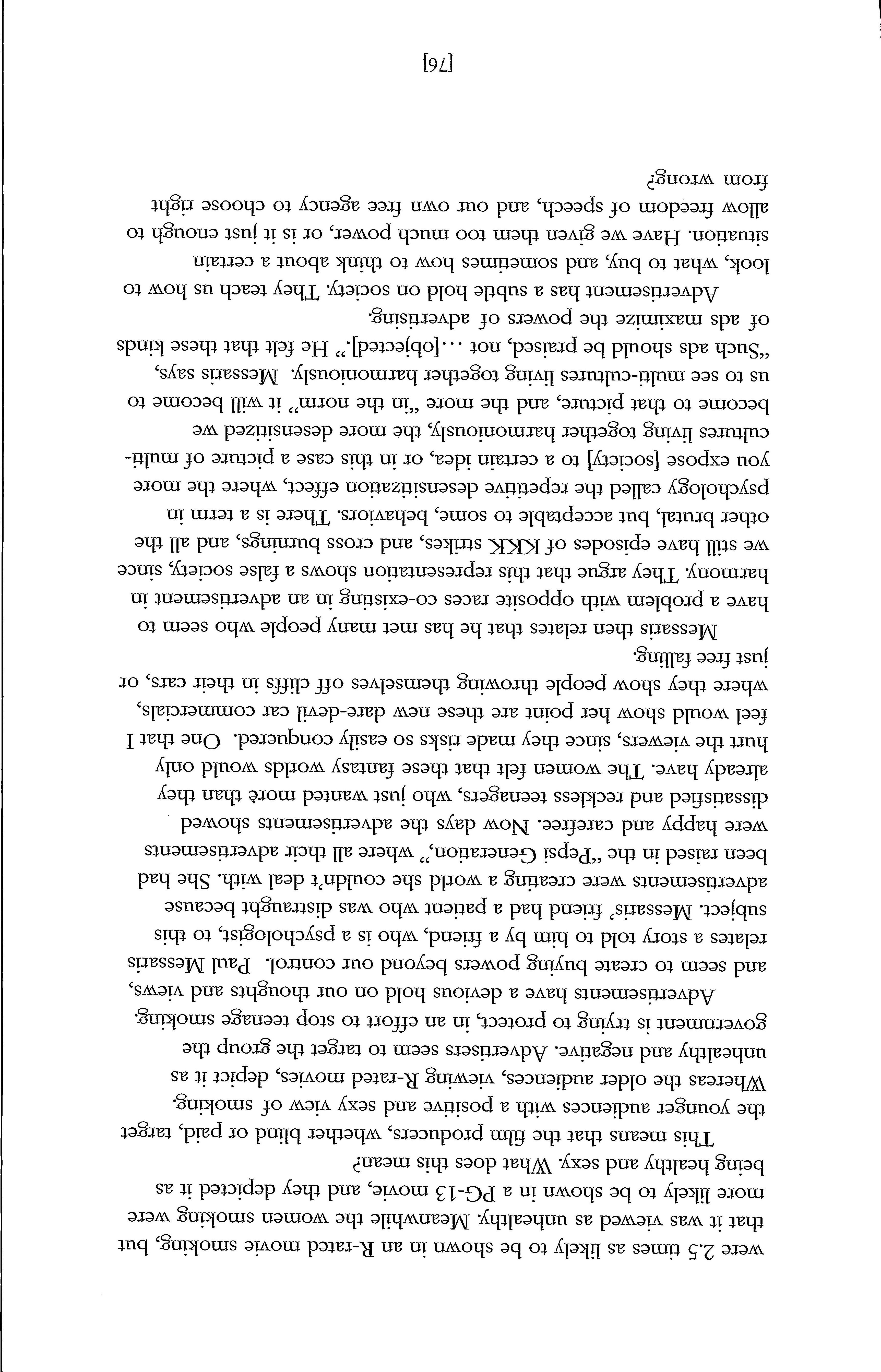
were 2.5 times as likely to be shown in an R-rated movie smoking, but that it was viewed as unhealthy. Meanwhile the women smoking were more likely to be shown in a PG-13 movie, and they depicted it as being healthy and sexy. What does this mean?
This means that the film producers, whether blind or paid, target the younger audiences with a positive and sexy view of smoking. Whereas the older audiences, viewing R-rated movies, depict it as unhealthy and negative. Advertisers seem to target the group the government is trying to protect, in an effort to stop teenage smoking.
Advertisements have a devious hold on our thoughts and views, and seem to create buying powers beyond our control. Paul Messaris relates a story told to him by a friend, who is a psychologist, to this subject. Messaris' friend had a patient who was distraught because advertisements were creating a world she couldn't deal with. She had been raised in the "Pepsi Generation," where all their advertisements were happy and carefree. Now days the advertisements showed dissatisfied and reckless teenagers, who just wanted more than they already have. The women felt that these fantasy worlds would only hurt the viewers, since they made risks so easily conquered. One that I feel would show her point are these new dare-devil car commercials, where they show people throwing themselves off cliffs in their cars, or just free falling.
Messaris then relates that he has met many people who seem to have a problem with opposite races co-existing in an advertisement in harmony. They argue that this representation shows a false society, since we still have episodes of K.Kl<: strikes, and cross burnings, and all the other brutal, but acceptable to some, behaviors. There is a term in psychology called the repetitive desensitization effect, where the more you expose [society] to a certain idea, or in this case a picture of multicultures living together harmoniously, the more desensitized we become to that picture, and the more "in the norm" it will become to us to see multi-cultures living together harmoniously. Messaris says, "Such ads should be praised, not [objected]." He felt that these kinds of ads maximize the powers of advertising.
Advertisement has a subtle hold on society. They teach us how to look, what to buy, and sometimes how to think about a certain situation. Have we given them too much power, or is it just enough to allow freedom of speech, and our own free agency to choose right from wrong?
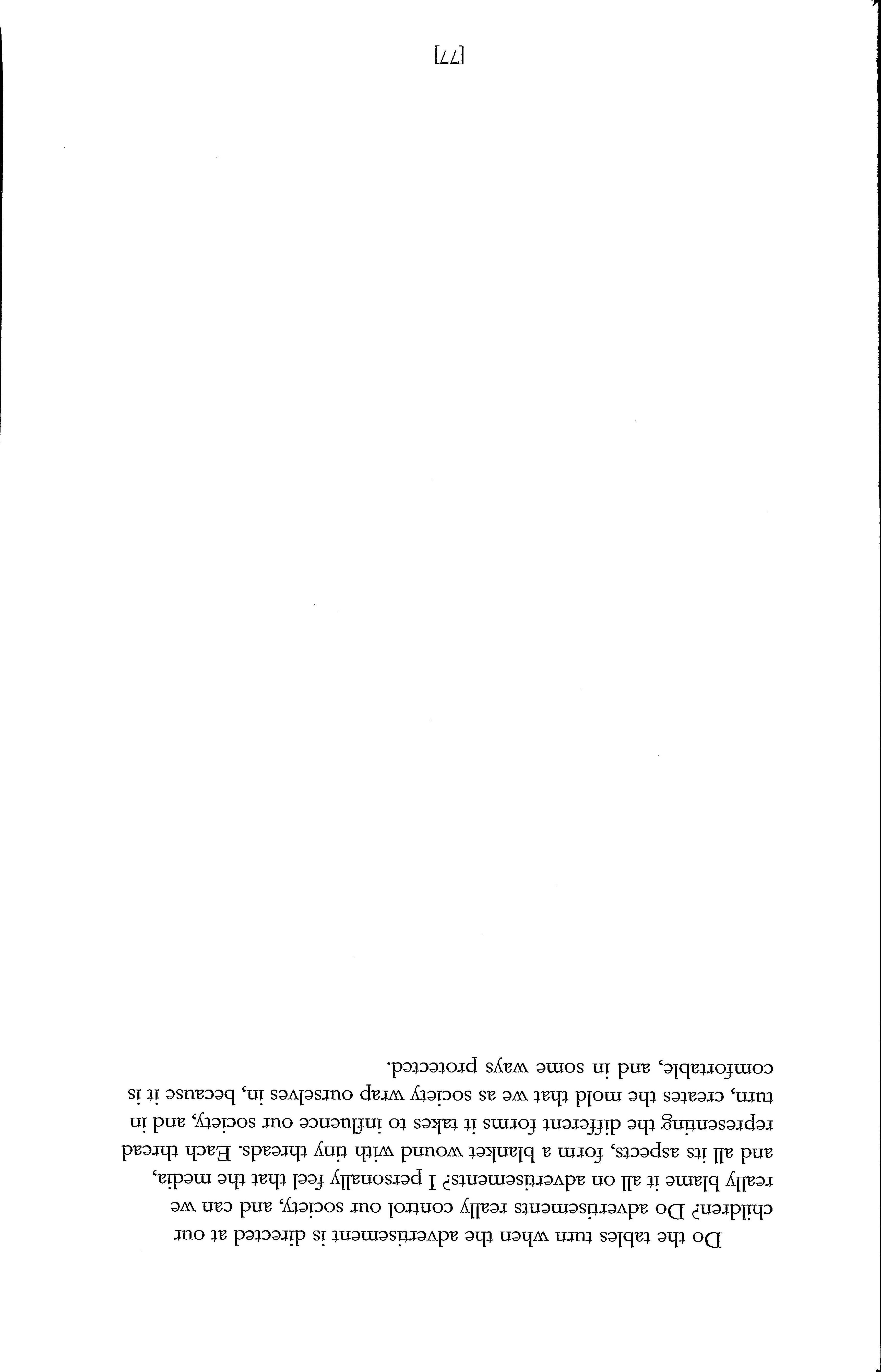
Do the tables turn when the advertisement is directed at our children? Do advertisements really control our society, and can we really blame it all on advertisements? I personally feel that the media, and all its aspects, form a blanket wound with tiny threads. Each thread representing the different forms it takes to influence our society, and in turn, creates the mold that we as society wrap ourselves in, because it is comfortable, and in some ways protected.

Walking through the aisles of a typical video rental store, you will be hard pressed to find many queer films which accurately depict gay life. Undoubtedly, you will have more luck looking through the gay and lesbian film section of your local, independent, video store. However, when studying and analyzing popular culture, it is important to examine what is easily available to the masses. Kissing]essica Stein is a recently released (2001) film available in any corporate video store. Veering from the usual heterosexual romantic comedy, Kissing Jessica Stein attempts to offer an alternative to the common man-meetswoman storyline. However, despite its attempts to be progressive in regards to female sexuality, Kissing Jessica Stein portrays bisexual and lesbian women in a potentially detrimental (and arguably inaccurate) manner and does little to win women a greater range of experiences.
Kissing Jessica Stein is the story of two single women searching for fulfillment through companionship and intimacy. The movie's main character, Jessica Stein, is a twenty-something single woman (not a girl as the movie's cover caption states) originally searching for the perfect man, but finding herself repetitively disappointed by the choices of men she encounters. As a final resort, Jessica responds to an intellectually appealing women-seeking-women ad, which leads her into the hands of sexually eager and persuasive bisexual, Helen. Upon their first meeting, previously heterosexual Jessica is very hesitant to follow through with her sexual curiosity (which, notably began as an intellectual curiosity, apparently having nothing to do with being attracted to the idea of being with a woman intimately or sexually). However, with repeated and eager attempts to persuade disinterested Jessica, Helen finally wins over Jessica, and the two begin a dating relationship. This initial meeting and coming together of Jessica and Helen exemplifies the common stereotype that lesbians are women who have failed in the

world of heterosexuality, and have thus turn to lesbianism as a last ditch resort. Although I cannot speak for all lesbians, I can speak from personal experience; my experience as a lesbian has far more to do with loving women than feeling frustrated by men, which is unquestionably the case for many other, if not the vast majority of, lesbians.
Lesbianism as portrayed as a last resort or turning away from men is a "safe" way to serve the dominant culture's audiences the notion that women only seek women if they are heterosexual failures Gessica) or excessively lusty bisexuals (Helen). The message in Kissing Jessica Stein is that lesbianism occurs either as a frustrated fleeing from an otherwise heterosexual life, or as a titillating and temporary sexual dabbling with other women. Although these characters may reflect the experience of some lesbian women, this concept of lesbians is extremely limited and largely inaccurate. These characters and their situations have been made to be palatable for straight audiences, whereas a more masculine lesbian character or a woman who exclusively loves women, independent of her experiences with men, would pose a much greater challenge to the status quo.
Of course, Jessica is white, conventionally attractive, thin, and extremely feminine. Not surprisingly, so is Helen. When Jessica's best friend asks Jessica what Helen is like,Jessica replies, "she's great ... she's agir/ she's thin, and she's seft " Granted, in the world of film much of a character's identity is in her appearance, and it is not uncommon (although it is unfortunate) for all of the main characters to be white, conventionally attractive, and thin. The setback lies in fact that Kissing Jessica Stein epitomizes the tendency of popular-culture lesbian characters to be depicted as extremely and exclusively feminine. What's so wrong with feminine, or "femme," lesbian characters, one might ask. The problem is not the presence of femme lesbian characters, after all many lesbians are indeed very feminine. The problem lies in disproportional and inaccurate number of more masculine or "butch" lesbians. Popular culture rarely, if ever, casts masculine lesbian characters. Why is there such an obvious lack of more masculine lesbian characters?
As in many other areas in our culture, women's and men's spheres are clearly delineated, and obvious power shifts may occur when women occupy areas that are traditionally considered men's. This is as true with sexuality as it is with anything else. Just what kind of power might women be encroaching upon if they were sexual competitors with, or sexual equals to, men? The underlying message behind the

tendency to depict lesbian relationships as strictly and overtly femmefemme partnerships might be that so long as women "stay in their place" as weak, passive, feminine, and unassertive sexual beings, dabbling in same-sex encounters is okay. Conversely, if more lesbian characters were depicted as strong, confident, and sexually assertive these women would pose a potential threat to the sexual status quo of women being solely the sexual property of men. There is something overtly sexist and homophobic about a media that shows no qualms with regularly showing women sexually demeaned, beaten, and even killed but hesitates to show two women loving each other in an accurate, healthy, and meaningful way.
Although Kissing Jessica Stein was written by a women, Heather J uergensen, it was directed, produced, and edited by men. This becomes abundantly clear as Jessica and Helen's relationship eroticizes femme-femme relationships seemingly for men's pleasure. It is often as though Jessica and Helen are not so much enjoying the complete act of being with each other for their own pleasure, but rather for the sexual gratification that male onlookers get from seeing two women being sexually intimate. In fact, the first time Helen successfully seduces Jessica is when the two are at a restaurant where two men join them and explain their reasons for finding women being sexual with other women as appealing. We quickly come to realize that the supposedly homoerotic scenes are intended largely for the satisfaction of its male viewers. Perhaps this film wasn't only directed, produced, and edited l!J men, but also for men.
Additionally, although Jessica and Helen are both apparently selfsupportive artists, they have absolutely no difficulty leading economically comfortable lives as middle-to-upper-class women. In addition to being white, extremely feminine, and conventionally attractive, these two women are also wealthy. The fact that both of these women are middle-to-upper class is yet another way that Kissing Jessica Stein narrows the already limited scope of gay characterization. How might audiences react to a Black, butch, working class lesbian, for example? Although such a lesbian is perhaps a more realistic portrayal, she would not pacify the dominant culture's audiences into believing lesbians are basically feminine, wealthy, and conformist.
Kissing Jessica Stein also fails to show lesbianism in its cultural or social context. Jessica and Helen live otherwise very "straight lives;' with the exception of Helen's two excessively stereotypical gay male

friends. Thus, not only are the lesbian characters greatly feminized, but they are also removed from a realistic social and cultural gay context. Perhaps this is to send the message to straight audiences that lesbians can be (and in this case are) just like straight women if they so choose. Oddly, although Jessica and Helen are apparently not part of a lesbian sub-culture, they seem to have no difficulty assimilating into a predominantly heterosexual culture. Sure,Jessica is initially timid about "coming out," but in the world of Jessica Stein there is no such thing as snide remarks, gay bashing, or hate crimes to fear as these two women openly kiss on busy streets.
On a more optimistic note, it is important to recognize that the visibility of gay life in the film industry has indeed become much greater since the historic 1960's raid of the Stonewall Inn. Visibility is often a necessary step toward understanding of and equality for marginalized groups. However, as consumers of an imperfect film industry I believe that it is important to not only be concerned with the quantity of visibility but also the quality and accuracy of this visibility. One might ask the question, is this new visibility actually helping the gay and lesbian population or is it hindering us on our way to greater freedom and equality? Visibility of marginalized groups is not always an inherently good thing. Indeed, visibility can actually perpetuate stereotypes and even create new ones that limit the lives of those within the marginalized group. In many ways, Nssing]essica Stein exemplifies Suzanna Danuta Walters' idea in Ali the Rage: The Story ef Gay Visibiii!J in America that, "new visibility creates new forms of homophobia and lends itself to a false and dangerous substitution of cultural visibility for inclusive citizenship ... this moment provides us with a picture of a society readily embracing the images of gay life but still all too reluctant to embrace the realities of gay identities ... We may be seen, now, but I'm not sure we are known."
As a lesbian I feel that the overwhelming majority of images of lesbian women in popular culture are not only extremely inaccurate, but are also potentially dangerous as they create an image of lesbianism that is not honest, and thus not one that I am able (or wish to, for that matter) to conform. Thus, not only am I marginalized within a predominantly heterosexist culture, but I am also temporarily marginalized within my own group by being an outsider to the depictions of lesbians in pop-culture. Additionally, as individuals often come to know "others" through popular culture images, this inaccurate and unrealistic
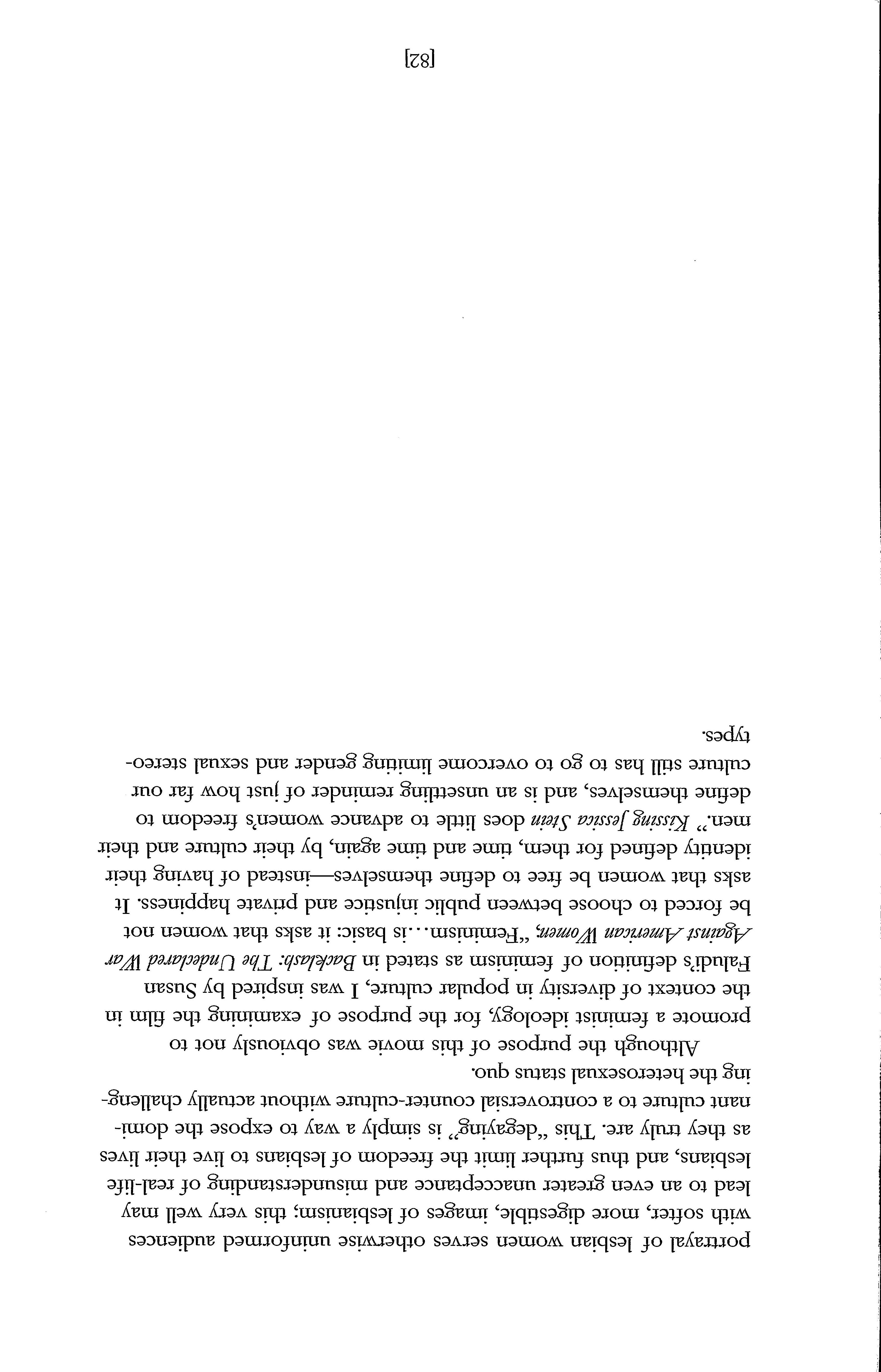
portrayal of lesbian women serves otherwise uninformed audiences with softer, more digestible, images of lesbianism; this very well may lead to an even greater unacceptance and misunderstanding of real-life lesbians, and thus further limit the freedom of lesbians to live their lives as they truly are. This "degaying'' is simply a way to expose the dominant culture to a controversial counter-culture without actually challenging the heterosexual status quo.
Although the purpose of this movie was obviously not to promote a feminist ideology, for the purpose of examining the film in the context of diversity in popular culture, I was inspired by Susan Faludi's definition of feminism as stated in Backlash: The Undeclared War Against American Women; "Feminism .. .is basic: it asks that women not be forced to choose between public injustice and private happiness. It asks that women be free to define themselves-instead of having their identity defined for them, time and time again, by their culture and their men." Kissing Jessica Stein does little to advance women's freedom to define themselves, and is an unsettling reminder of just how far our culture still has to go to overcome limiting gender and sexual stereotypes.

ry-1he morning was cool and brilliant with the sun glistening through .1. the majestic pine trees. It was a radiant summer morning in the quiet, peaceful town of Washougal, Washington. It was the morning of July 26, 1989 and the final day of our family vacation to Oregon and Washington. The air was crisp and clean. It gave me an energized surge of excitement for the upcoming day. Jeff and I woke up feeling rested and ready for the day ahead. We had woken up early to get a good start for the long journey ahead of us back home to Utah. I felt saddened, it was time to get on our way. We were so relaxed and happy in this place. I couldn't explain the feelings washing over me, as I would stare longingly into the dense, lush forest surrounding us on all sides.
The morning air was crisp on my face as Jeff and I quickly prepared for our journey. Each of us picked up a sleeping and very precious child and carried them gently to our waiting vehicle. We gave hugs and kisses and jumped inside anxious to begin the long drive.
The scenery through the mountains in Washington was exquisite and breathtaking. We had driven for only a few hours when I became increasingly restless. After several hours in the car, I became very insistent and finally Jeff gave in and told me that we would stop in Boise, Idaho, and I could drive. It didn't take us long to spot a large sign we recognized "WENDY'S" so we pulled right in. It was late in the afternoon on that smoldering hot day near the end of July. The air was hot against our skin and we were all wearing lightweight summer clothes. Everyone was hungry and we had decided to stop and make this our last meal before we got home.
Jeff said to us, "Come on we're going to have a picnic in our car, because it's too hot to have a picnic outside!" I was delighted. He never let us eat in the car, this was a miracle. We all sat in the back with the refreshing air cooling us. We had a fabulous time enjoying our meal while laughing
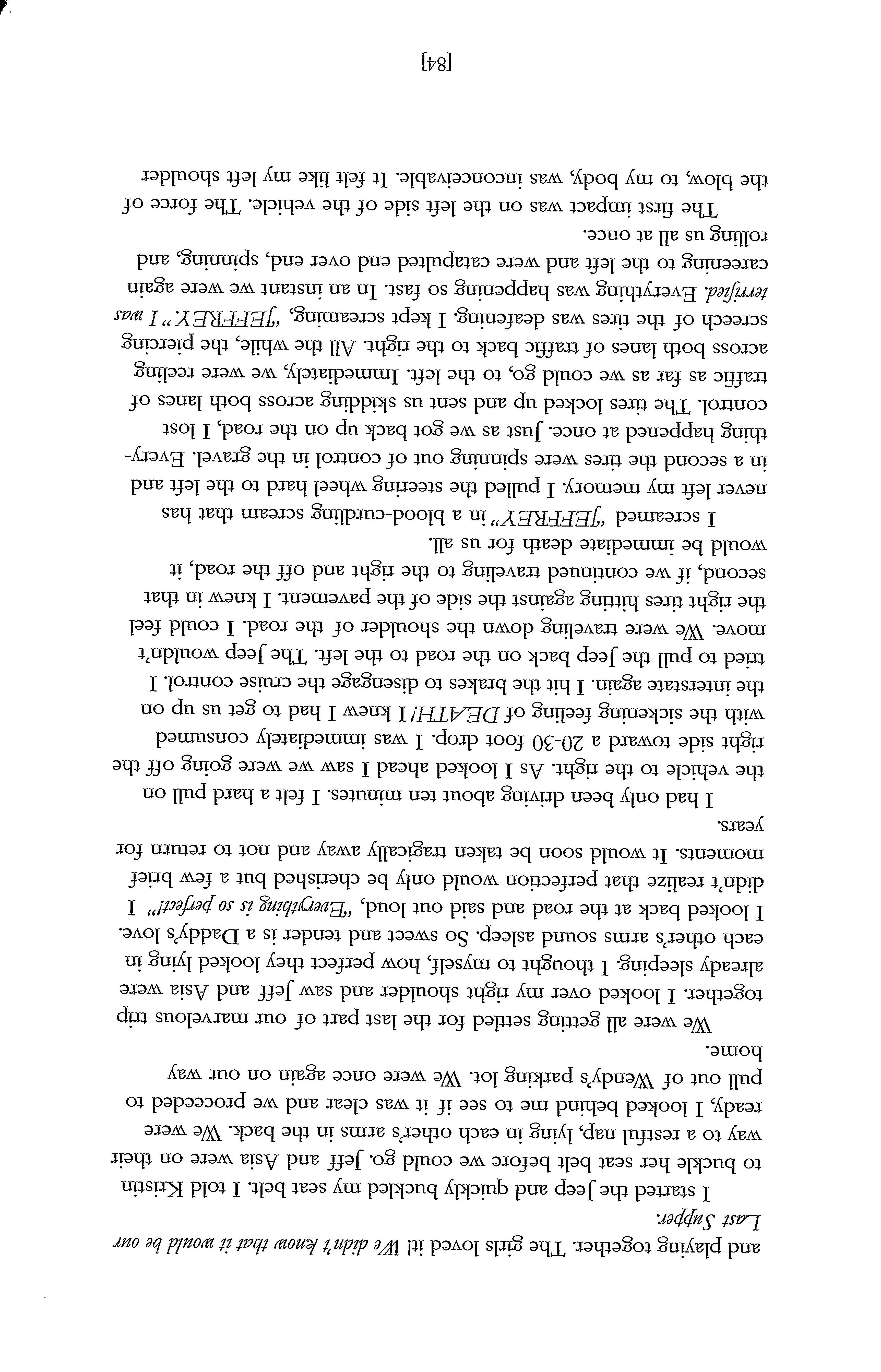
and playing together. The girls loved it! We didn't know that it would be our Last Supper.
I started the Jeep and quickly buckled my seat belt. I told I<:.ristin to buckle her seat belt before we could go. Jeff and Asia were on their way to a restful nap, lying in each other's arms in the back. We were ready, I looked behind me to see if it was clear and we proceeded to pull out of Wendy's parking lot. We were once again on our way home.
We were all getting settled for the last part of our marvelous trip together. I looked over my right shoulder and saw Jeff and Asia were already sleeping. I thought to myself, how perfect they looked lying in each other's arms sound asleep. So sweet and tender is a Daddy's love. I looked back at the road and said out loud, "Everything is so petfect!" I didn't realize that perfection would only be cherished but a few brief moments. It would soon be taken tragically away and not to return for years.
I had only been driving about ten minutes. I felt a hard pull on the vehicle to the right. As I looked ahead I saw we were going off the right side toward a 20-30 foot drop. I was immediately consumed with the sickening feeling of DEATH! I knew I had to get us up on the interstate again. I hit the brakes to disengage the cruise control. I tried to pull the Jeep back on the road to the left. The Jeep wouldn't move. We were traveling down the shoulder of the road. I could feel the right tires hitting against the side of the pavement. I knew in that second, if we continued traveling to the right and off the road, it would be immediate death for us all.
I screamed 'JEFFREY" in a blood-curdling scream that has never left my memory. I pulled the steering wheel hard to the left and in a second the tires were spinning out of control in the gravel. Everything happened at once. Just as we got back up on the road, I lost control. The tires locked up and sent us skidding across both lanes of traffic as far as we could go, to the left. Immediately, we were reeling across both lanes of traffic back to the right. All the while, the piercing screech of the tires was deafening. I kept screaming, 'JEFFREY." I was terrified. Everything was happening so fast. In an instant we were again careening to the left and were catapulted end over end, spinning, and rolling us all at once.
The first impact was on the left side of the vehicle. The force of the blow, to my body, was inconceivable. It felt like my left shoulder

and side of my face was slammed into the unforgiving surface below. It was so overwhelming it made me feel numb and incoherent. The sound of glass shattering and metal twisting was horrifying and would haunt me for days and weeks, afterward. We continued to somersault out of control down off the freeway in the gravel, weeds, and debris. We traveled quite some distance before the Jeep finally came to a stop, upside down and back in the path of oncoming traffic. We again were spared the tragedy of other vehicles crashing into us. Not one vehicle or person came close to being in the destructive path of that accident.
When I realized we had finally stopped rolling, I instinctively wanted to know about my family. I was upside down and trapped inside. I kept clawing and scratching at the buckle trying to release me from this horrific prison. I knew I had to get out of that Jeep RIGHT NOW.
I had remained conscious throughout the entire accident and knew I had to get to my husband and daughters. I didn't know what had happened to them or even where they were. I couldn't stop thinking and agonizing about them. Were thry hurt? Were thry crushed inside the Jeep? Were thry dead?These were the questions that quickly and unrelentingly kept bombarding my every thought. I hurt all over. My head was spinning in a million directions at once.
I kept hearing Jeff's voice saying to me over the years. "You'll panic, I knowyou'llpanic. I hope nothing ever happens because I knowyou can't handle it. You will lose it!" Well, I just kept telling myself I couldn't panic. I needed to remain calm. I felt like I was falling into an abyss. I had to fight back and not give in. I had to get out of this crumpled mess I was trapped in. I had to find my family immediately.
The crimson colored blood was dripping from my left forearm, my head throbbed from beating the ground and smashing against a piece of mangled metal from the twisted roof. Everything started to spin out of control. My entire body ached. I could think of nothing else at this moment. The pain I was feeling was excruciating. I could not handle this.
I didn't think of the pain I was in. I heard a voice inside telling me to "Relax, push myse!f qf the roef ef the car, releasing ff!Y weight qf the seat belt; disengage the seat belt, and.ftnal/y climb out the driver's side window. "I hesitated for just a second before realizing this is exactly what I needed to do, at this moment. I stopped thinking and started listening to my inner voice whispering exactly what needed to be done.
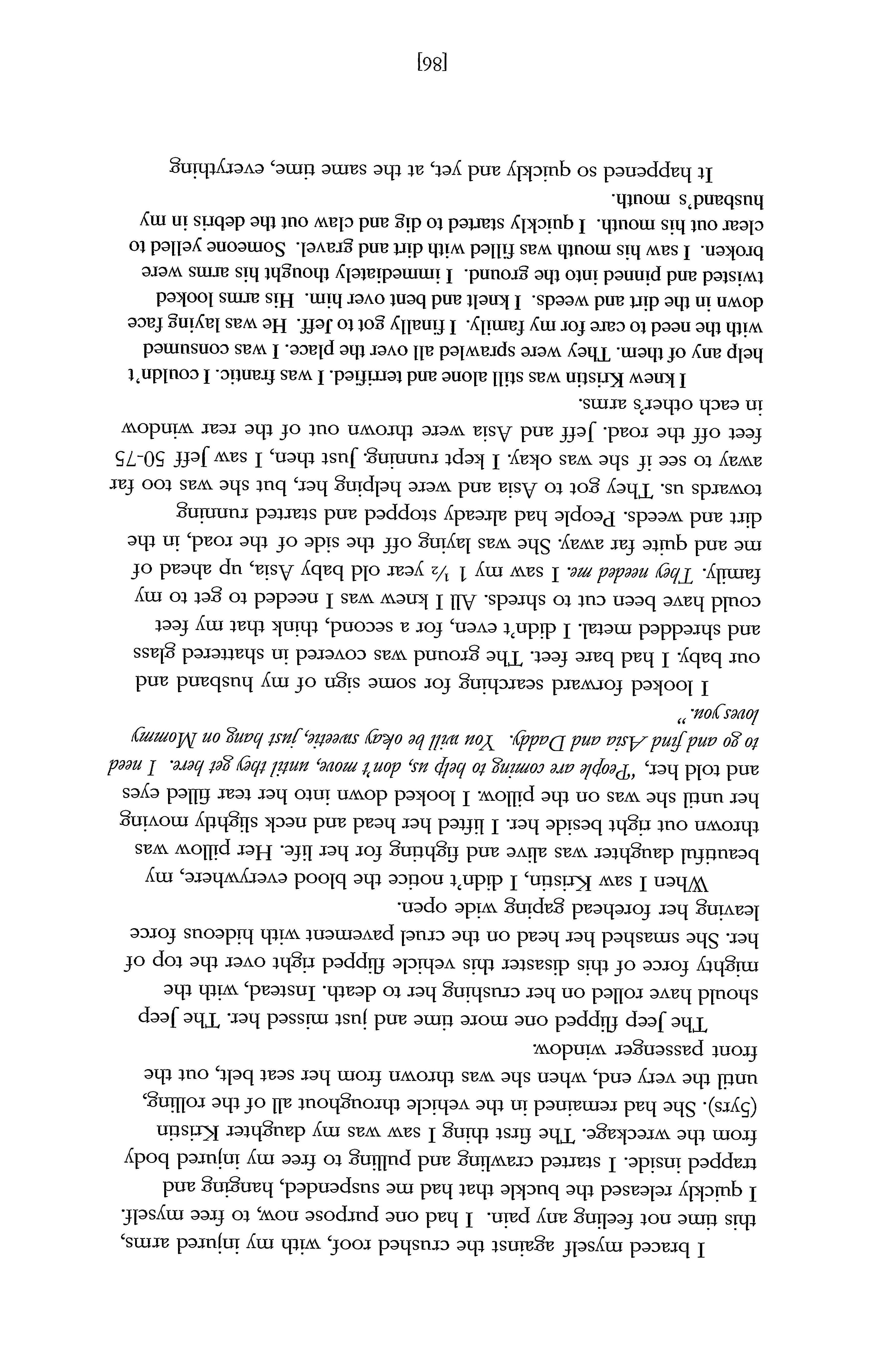
I braced myself against the crushed roof, with my injured arms, this time not feeling any pain. I had one purpose now, to free myself. I quickly released the buckle that had me suspended, hanging and trapped inside. I started crawling and pulling to free my injured body from the wreckage. The first thing I saw was my daughter Kristin (Syrs). She had remained in the vehicle throughout all of the rolling, until the very end, when she was thrown from her seat belt, out the front passenger window.
The Jeep flipped one more time and just missed her. The Jeep should have rolled on her crushing her to death. Instead, with the mighty force of this disaster this vehicle flipped right over the top of her. She smashed her head on the cruel pavement with hideous force leaving her forehead gaping wide open.
When I saw Kristin, I didn't notice the blood everywhere, my beautiful daughter was alive and fighting for her life. Her pillow was thrown out right beside her. I lifted her head and neck slightly moving her until she was on the pillow. I looked down into her tear filled eyes and told her, ''People are coming to help us, don't move, until thry get here. I need to go andfind Asia and Dadcfy. You will be okqy sweetie,just hang on Mommy lovesyou."
I looked forward searching for some sign of my husband and our baby. I had bare feet. The ground was covered in shattered glass and shredded metal. I didn't even, for a second, think that my feet could have been cut to shreds. All I knew was I needed to get to my family. Thry needed me. I saw my 1 ½ year old baby Asia, up ahead of me and quite far away. She was laying off the side of the road, in the dirt and weeds. People had already stopped and started running towards us. They got to Asia and were helping her, but she was too far away to see if she was okay. I kept running. Just then, I saw Jeff 50- 75 feet off the road. Jeff and Asia were thrown out of the rear window in each other's arms.
I knew Kristin was still alone and terrified. I was frantic. I couldn't help any of them. They were sprawled all over the place. I was consumed with the need to care for my family. I finally got to Jeff. He was laying face down in the dirt and weeds. I knelt and bent over him. His arms looked twisted and pinned into the ground. I immediately thought his arms were broken. I saw his mouth was filled with dirt and gravel. Someone yelled to clear out his mouth. I quickly started to dig and claw out the debris in my husband's mouth.
It happened so quickly and yet, at the same time, everything

seemed to move in slow morion. In a flash Jeff was standing up, in front of me. His arms and body were thrashing about wildly. He was moaning and groaning. He was making these horrendous sounds, but could not speak. He was looking at me, trying to say something as if he were screaming at me. I couldn't hear any words, just heartbreaking sounds of the man I loved in great pain and distress.
I felt so helpless. I couldn't take away his suffering and pain. I couldn't believe what was happening to us. Instantly, men surrounded him and lay him on the ground. They tried to keep him calm, until the ambulance came. When I knew someone was taking care of Jeff, I immediately took off running toward Asia.
As I got to her, I put my arms out to pick her up and comfort her. I was told not to move her. I wasn't thinking too dearly. I was not able to hold, soothe or take away the suffering of my family. The physical and emotional pain was so heavy and burdening. I couldn't take seeing them suffer like this endlessly. I went crashing to the earth below. I was losing consciousness. I was so incredibly tired. I just wanted to sleep, but I couldn't.
Asia kept crying, ''M.ommy, o~ o~ Mommy!" I was overcome with grief and knew I had to do something to help her, even if I could not get up. The only thing I could do for her was to sing. I started to sing her favorite song, 'The eensie weensie spider. "I kept singing to keep her mind focused off the pain and suffering. Soon she stopped crying and just whimpered.
I knew help was on the way and I needed to stay strong until the ambulance arrived. I was so worried if Kristin was okay. Asia was right beside me, her cries of pain and agony, will never leave my memory. To look at her bloody and beaten face, caused me more pain than I can express. I didn't get to spend any rime with Kristin, so her injuries didn't have rime to penetrate my reeling brain. I just knew that she was alive. I prayed for her and her daddy.
The ambulance arrived to help us. It had seemed like hours and yet it was only a matter of minutes. I truly believe their quick response saved, my daughter, Kristin's life. Kristin was in serious trouble. Her liver had been lacerated and could have caused her to bleed to death, from the internal injuries sustained and the open bleeding wound on her forehead.
The emergency technicians told me they were going to have to strap Asia to my legs. They were putting her in a papoose, so she

couldn't move. At first, the EMT's wanted to put Kristin and Jeff in the same ambulance because both of their injuries were life threatening. If they needed to work on him to keep him alive, it wasn't wise to have his 5-year-old daughter watching and listening. Especialfy, if he didn't make it.
I started pleading with the paramedic for information about my husband. I needed to know right now! I asked him, 'Please find out af'!)'thingyou can about him. I need to know the truth. Don't keep af'!)'thingfrom me. " He radioed the other ambulance and found out what I wanted. He quickly came back and knelt beside me. He whispered in my ear, 'No matter what happens to your husband,you must remember thatyou have to stqy strong.foryour little girls. " Right then, before he told me anymore, I knew that Jeff was dead. He continued, "Your husband has arrested and thry are still working on him. Thry haven't been able to get his vital signs stable. Thry will continue to work on him and do everything thry can." He touched my arm, as if to say I'm sorry.
I didn't realize, but I was about to face the most challenging times in my entire life. This would become a fight for survival and a test of my faith and strength.
I know that I was given the strength and courage to handle the decisions and make the necessary arrangements for my husband. I would need inspiration and determination to take care of and raise my two young daughters alone. I was left a widow with only $7.00 in my wallet and unable to work for three months due to my injuries. Thanks to our families' love and support, money would be the least of my worries. I would need strength to wake up and face each day as a single parent.
Jeff told me four different times he would not live to be thirty. He didn't. He died three months before his birthday. He told me time was running out. Jeff had a dream several months earlier and the words he used to describe the dream were the exact words I used when I told my family how I found him. He told me exactly what clothes to bury him in, the rainbow trout he wanted in his casket along with his fishing pole. He knew what music to play, "Greatest Love of All" by Whitney Houston. He wanted music that inspired people to .feel something inside.
The still small voice kept telling me what to do next. I remembered everything he had told for so many months. He had been preparing me for this tragedy in our lives and I didn't know it. These
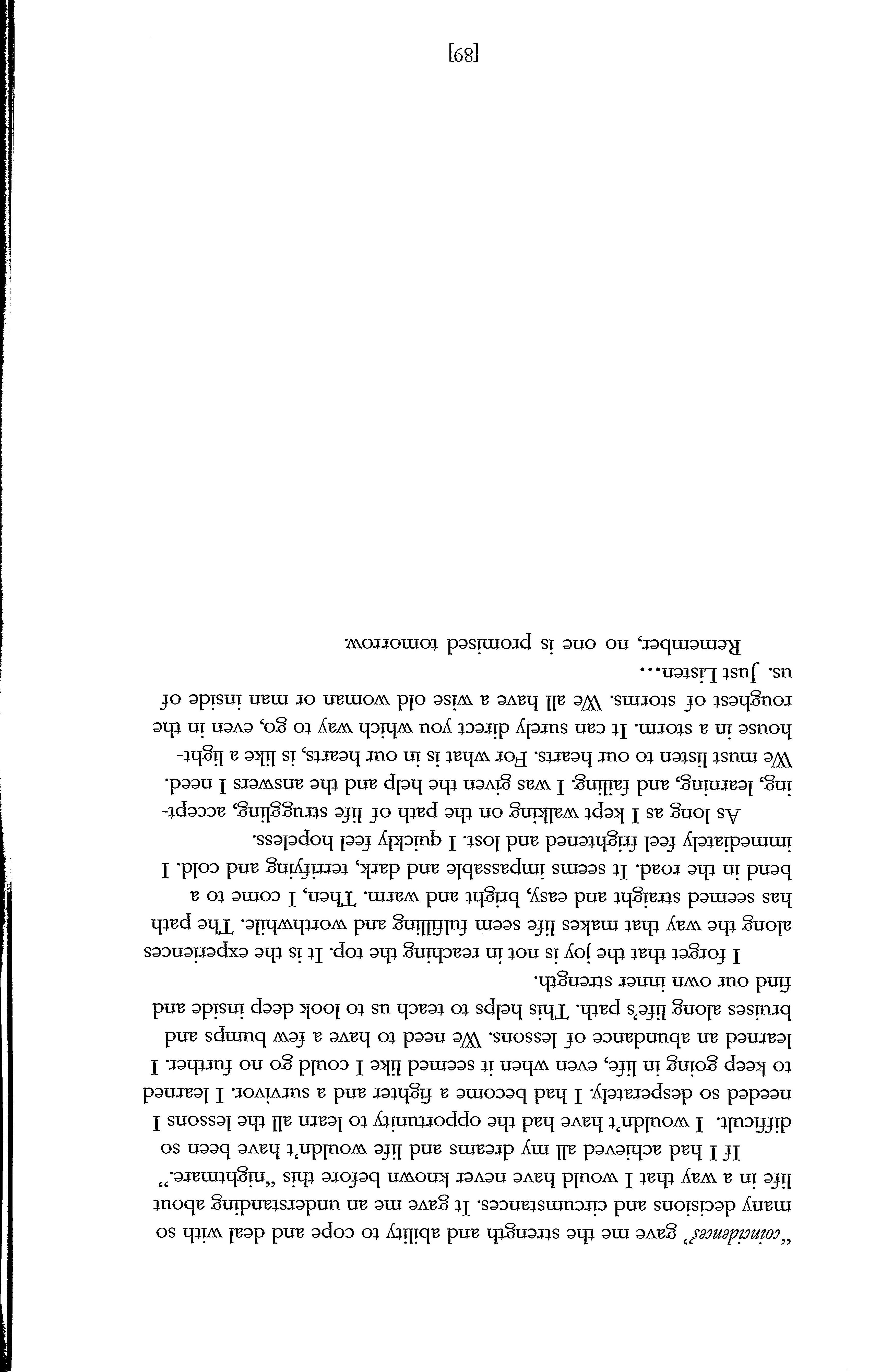
"coincidence.?' gave me the strength and ability to cope and deal with so many decisions and circumstances. It gave me an understanding about life in a way that I would have never known before this "nightmare."
If I had achieved all my dreams and life wouldn't have been so difficult. I wouldn't have had the opportunity to learn all the lessons I needed so desperately. I had become a fighter and a survivor. I learned to keep going in life, even when it seemed like I could go no further. I learned an abundance of lessons. We need to have a few bumps and bruises along life's path. This helps to teach us to look deep inside and find our own inner strength.
I forget that the joy is not in reaching the top. It is the experiences along the way that makes life seem fulfilling and worthwhile. The path has seemed straight and easy, bright and warm. Then, I come to a bend in the road. It seems impassable and dark, terrifying and cold. I immediately feel frightened and lost. I quickly feel hopeless.
As long as I kept walking on the path of life struggling, accepting, learning, and failing. I was given the help and the answers I need. We must listen to our hearts. For what is in our hearts, is like a lighthouse in a storm. It can surely direct you which way to go, even in the roughest of storms. We all have a wise old woman or man inside of us. Just Listen ...
Remember, no one is promised tomorrow.
